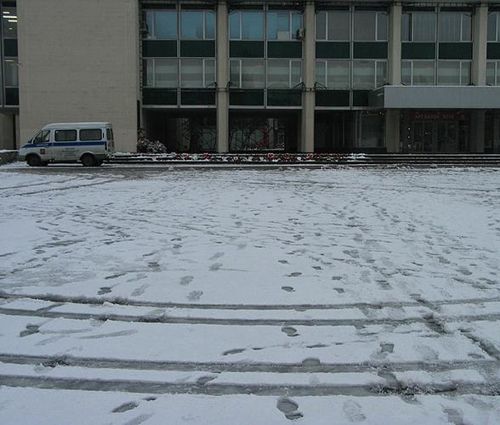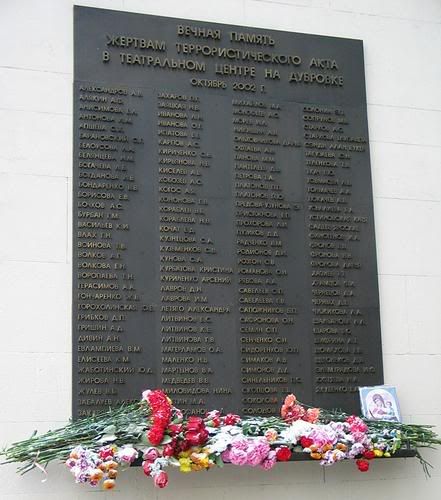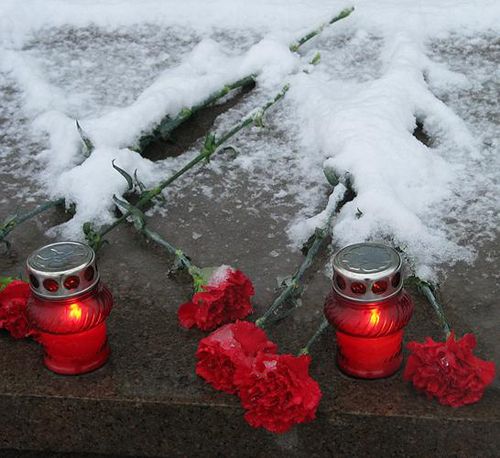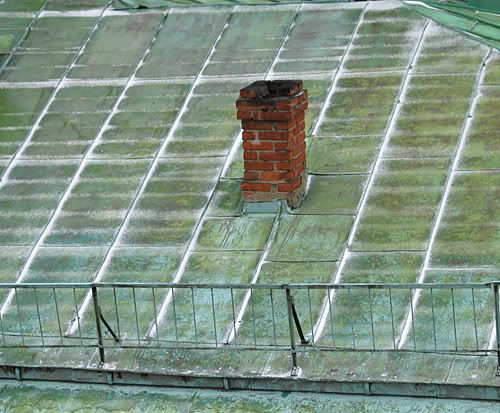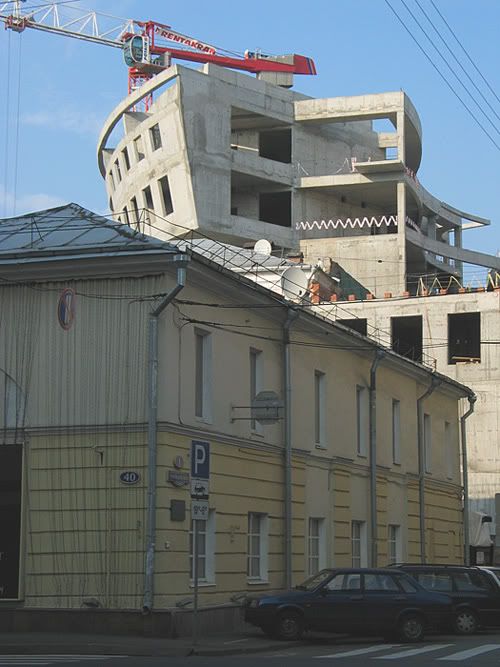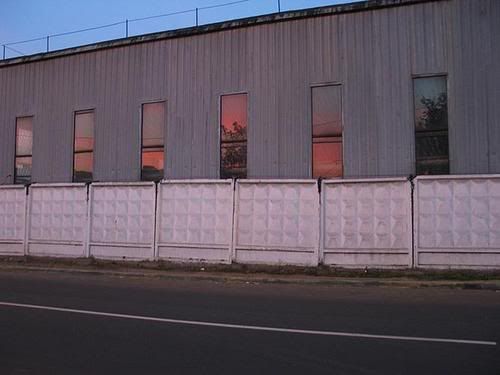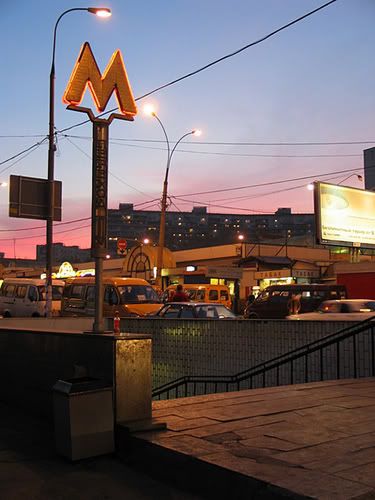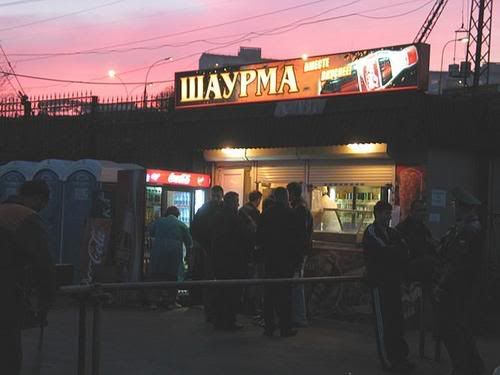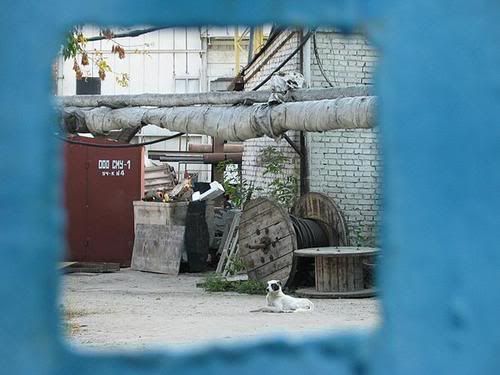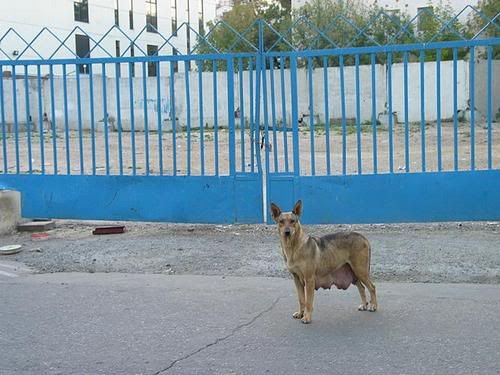Pregnancy notes:
Didn't fit into my high winter boots two days ago. Dresses and pants I understand, but footwear?
Getting up from the couch is an exercise in weightlifting.
Was planning to go for a walk today but got really exhausted while putting the boots on; got outside and realized that it was way too slippery; also, the air's much cleaner around the ninth floor, not down there in the street; ended up going to the store and back; on the way there, I was still trying to catch my breath after the struggle with the boots.
My pants keep sliding down my belly, but that's nothing compared to my fear of shoelaces getting untied in the middle of the street.
One of my greatest irrational fears is of my waters breaking while I'm on the subway during rush hour.
Friday, October 28, 2005
PRI's The World is airing Andrew Sussman's tribute to Oleg Lundstrem today - the text is here.
My photos from that March 2004 interview are here - and I'm even mentioned in the text!..
My papa was indeed very excited to learn that I had met Lundstrem in person; he was also very happy to see the pictures that I took, and a little video of Lundstrem talking of how he first began playing jazz - and I do hope papa still has all these on his computer, because I've somehow managed to lose the originals...
***
Oleg Lundstrem died on October 14, at the age of 89. My post about it on this blog is here.
My photos from that March 2004 interview are here - and I'm even mentioned in the text!..
[...]
Muscovites are hard to impress. They're big city blasé. But when I told friends I was going to see Oleg Lundstrem, the man who created tunes like Atom Boogie, they took note. Wait till I tell my Dad, said my friend Veronica. Get his autograph, Andrei advised me. And from one Western reporter, bring two notebooks. He has many, many stories and they're all great.
[...]
My papa was indeed very excited to learn that I had met Lundstrem in person; he was also very happy to see the pictures that I took, and a little video of Lundstrem talking of how he first began playing jazz - and I do hope papa still has all these on his computer, because I've somehow managed to lose the originals...
***
Oleg Lundstrem died on October 14, at the age of 89. My post about it on this blog is here.
Wednesday, October 26, 2005
Below is my three-year-old text on the Nord-Ost theater siege.

TEN-TWENTY-THREE
In times of distress, I turn to Italian pop music of the 1980s: Riccardo Fogli and Pupo have the strongest therapeutic effect on me. Passionate yet soothing, and only God knows what they are singing about in this wonderful language of theirs. Must be love, sunshine and the breathtaking blue-eyed beauties. I continue thinking my gloomy thoughts, with Fogli or Pupo serenading in the background, and then, all of a sudden, I'm happy again, or writing something too sentimental.
On October 29, it was different. In the evening, I was trying to take a break from thinking about the dead and the surviving former hostages. When I finished my second glass of red wine, I had a vision: a huge, ugly face - a blend of Putin the Sly Spy and Zyuganov the Communist Joker - almost rubbing against my cheek, grinning in this crazy, angelically ominous way. The face of Russia, I thought.
When I was about to put on the Italians CD, an unknown force diverted my hand and I ended up listening to Pet Shop Boys. Very soon, my delirious sobriety returned: less than a week since 10/23, with three Kremlin red stars and two proud Russian flags visible from my window at night, I had no other choice but to believe that a song called "The Theatre" was about Moscow, not London - about the Chechens, and not about the disadvantaged young Brits.
"...While you pretend not to notice
All the years we've been here
We're the bums you step over
As you leave the Theatre
It's another world here
Somebody is singing
I was only wishing
For a bit of cash
From a patron of the arts
Or at least the phantom of the opera
Will I catch your eye?.."
October 29 must have been marked as the Day of Revelations on some PopJunkie Saint's calendar.
***
"And perhaps 'The Theatre' could be used on a radio piece about that gay club, Central Station-2, which opened at the end of September in the 'Nord-Ost' theater's basement. There were rumors that the terrorists had hidden their explosives there and that the special forces blew up one of the club's walls to storm the besieged building."
This was an irrelevant afterthought that I shared the next day with an American journalist I was assisting, one of the few precious people who helped me keep my sanity throughout most of the 10/23 ordeal.
The first chaotic steps away from helplessly sitting guard in front of the TV, however, I took on my own. On Friday, October 25, some forty hours since the hostage crisis began and seventeen more to go before gas would be pumped into the theater, I decided to go to Red Square, where a small group of the hostages' friends and relatives was trying to hold an anti-war rally.
A Russian acquaintance called me just when I was ready to leave. Forgetting that he never missed a chance to expose my touchy-feely nature, I greeted him the only way I could then: "I hope no one you know is in there."
"Veronica, my friends aren't the kind of people who go to musicals. What about yours?" he replied.
I didn't tell him that in this particular context his words sounded almost as foolish as, "Our friends aren't the kind of people who fly planes, take subways, eat out occasionally, live in apartment blocks and walk the streets of Moscow." All I said was that there seemed to be no one I knew in there, either.
By the time I reached Red Square, the protesters had heeded the city authorities' "request" to disperse and had moved back to the "Nord-Ost" neighborhood. In fifteen minutes I, too, was walking past dozens of buses lined up from the Proletarskaya subway station all the way to where the riot police, rescuers, diggers, journalists, relatives, friends, politicians and gawkers mingled at a safe distance from the besieged theater.
A neatly dressed elderly man - small, pale and subdued - caught up with me and asked how to get to the rehabilitation center for the hostages' relatives. I knew from the news that the place - misnamed by one journalist as the "filtration" center - had been set up in a technical school nearby, but I wasn't able to guide the man. He continued walking next to me for a couple more minutes, stooping as if someone sat on his shoulders, looking so lost, so lonely. "Do you have anyone in there?" I asked, and he whispered - almost exhaled - his reply: "yes... my son... and his girlfriend."
He soon crossed the street to ask a cop for directions, and I passed the crowds and entered a maze of crumbling five-storied apartment blocks and rusty garages that surrounded the theater packed with explosives. I spent some time eavesdropping on janitors, soldiers and the locals, wondering what Putin would have done had his daughters been inside the theater, along with 800 other poor souls, of whom I felt I already knew at least two.
When the rain turned into a real distraction, I went inside a bar within, maybe, half a mile from the theater. The TV on the wall was blaring a commercial of J-7 juices (sponsor of "The Last Hero," the Russian sibling of "Survivor"): "Everybody loves their freedom, everybody loves, everybody loves their freedom!"
***
On Sunday, October 27, I was back in the "Nord-Ost" area with the American journalist. At 1:30 p.m., there seemed to be as many reporters in front of the City Hospital #13 as there were relatives of the former hostages. The majority of the rescued - the conscious, the unconscious and the already dead - had been brought here more than 30 hours before, but there were still no exhaustive lists available. Family members were not allowed inside the hospital and had to continue their despairing vigil in the cold, rainy weather. The one hour deducted out of the three and a half days of their wait - with the switch to winter time that occurred at 3 a.m. on this last Sunday of October - hardly made any difference.
Two women walked away from the crowd by the hospital gate and, finding a patch of relatively mud-free surface on the edge of a sidewalk, lit up their cigarettes. One of them, Nadezhda, was the wife of Viktor Martynov, a clarinetist in the "Nord-Ost" orchestra; the other was his sister. They had no idea whether he was in Hospital #13 or in any of at least a dozen others; they did not know if he was dead or alive. They were getting no help from the officials, and only through a network of friends was it possible to obtain bits of information, which - so far - hadn't fused into a simple and definitive answer Nadezhda and her sister-in-law were looking for. They were so drained it was hard to tell if they were in their 30s, 40s or early 50s, and there were moments when Nadezhda was choking down tears and apologizing for these lapses into emotion. I stroked her shoulder and repeated several times that everything would be fine, that she'd soon find her husband healthy and happy. I didn't have courage to say that she'd find him alive, for that would have implied that he might be dead.
The City Hospital #13 is located on Velozavodskaya St., named after a bicycle factory. Very close to it is Sharikopodshipnikovskaya St., named after a plant that produces "sharikopodshipniki," or ball bearings (defined in my Collins Dictionary as bearings "consisting of steel balls rolling between a metal sleeve fitted over the rotating shaft and an outer sleeve held in the bearing housing, so reducing friction"). The building that housed the musical (and the gay club) used to be the ball-bearing factory's cultural center. Although the area is loosely called Dubrovka, a name that conditions one to think of an oak forest, the grim industrial connotations are more resilient. It is tempting to describe Dubrovka's scenery, both before and after the hostage tragedy, as lifted out of Tarkovskiy's "Stalker" - if it wasn't for the basic attributes of a functioning magapolis: lots of people and cars.
Right across the street and a parking lot from the battered "Nord-Ost" theater, a few people were waiting for a bus at a stop that, for the past year and four days, received those from the musical crowd who chose to take subway to Proletarskaya and then switch to a bus. Three women at the stop, and their little children, watched as the cars slowed down, reaching a makeshift memorial just slightly off the road: flowers, flowers, flowers. We asked them what they thought about the war in Chechnya, and they said there was no war. One of the women said the Chechens had a propensity for warfare in their genes and then, disregarding the presence of the kids, called the terrorists "vyblyadki," a very strong word that can be translated as "the whore's children." As we talked, people with bouquets were stepping out of cars every now and then, and the flower memorial continued to grow.
In the evening, we visited one of Moscow's mosques, intending to speak with a Chechen Diaspora member about the impact the hostage crisis had had on this large and very diverse community.
On my way there, I talked with a cab driver, a young Muslim of Azeri descent. I mentioned that I had once tried to study Arabic and still remembered a line from the Quran, "Iyyaka na'abudu wa iyyaka nasta'iin" ("You alone we worship, and to You alone turn for help"). He asked me, all of a sudden: "What do you think - is it necessary to kill all non-Muslims?" I turned all the way to him and said, totally incredulous: "Are you asking me?!" And he replied, "Yes." I told him that, of course, no one should kill anyone, no matter what the clerics say, because many of them are so good at producing interpretations that fit their goals. He seemed to agree with me, saying that when his uncle was translating the Quran, he realized that the verb usually rendered as "to kill" had another, less extreme meaning. When I tried to pay my fare, he refused to take the money. But I insisted because I felt I owed him not just for the ride - but also for that little reminder that there could be some consensus and things might not be as bad as they appeared.
The Chechen man who had earlier agreed to be interviewed, was reluctant when we met him in person. Having spent a quarter of an hour waiting for him outside the mosque's courtyard, we felt it was reasonable to take no for an answer. Some of the men who gathered at the mosque that night for a Sufi group meeting kept coming in and out of the courtyard, giving us suspicious, seemingly inhospitable looks. The paranoid atmosphere of the place was reinforced by the four residential buildings that encased the mosque, fencing it off the abnormally quiet street - in the post-10/23 circumstances, this encouraged strangers like us and, no doubt, the regulars of the mosque, to imagine a zillion Russian intelligence agents watching us from every single window.
When we left the premises of the mosque, a tiny part of me was discontent: if they really had nothing to hide, I thought, why were they afraid to talk?
Halfway to the subway station, we heard steps behind us and then a male voice, calling for us to wait. We turned and recognized a young, clean-shaven man who had been around when we were waiting outside the mosque. Awkwardly, he asked about the purpose of our visit to the mosque, and I immediately thought he was an undercover Federal Security Service agent.
He agreed to be interviewed, though, and spent the next 40 minutes talking non-stop about his fear for his own life, the danger that nearly all Chechens and others from the North Caucasus were facing in Moscow, the peaceful nature of Islam that he truly believed in, the Russian ex-girlfriend he had been dating for a whole year (who initially was convinced he was a clandestine terrorist) and his numerous Russian friends (who abandoned him after 10/23). He wasn't a Chechen but an Ingush, which, in the eyes of the Moscow police and other witch-hunters, was exactly the same thing. He was 26 and very eager to escape from "this damn country." He wasn't speaking for the others who stayed behind at the mosque, and I could see how his innocent confessions could potentially get him in trouble.
Thanks to him, I realized that it would have been wrong to blame those others who chose to remain in the shade: each one of them was on his own when it came to safety, and most of them had families to care for, too.
***
I am not one of those people who think all Muslims are evil; nor do I share the minority view that Muslims are better than the rest. There was no way I could think of the Azeri cab driver and the Ingush man as some rare, unique representatives of their faith. But I was still incredibly pleased to meet them because there are times when my rationality crumbles, and these two encounters helped me restore a huge part of it.
Unfortunately, episodes incomparably smaller than 10/23 sometimes seem enough to tip over the precious common-sense balance in my head. Three weeks before the hostage crisis, I was in another cab, with another Azeri driver. When I told him I was Ukrainian, he asked if I thought it would have been better had Adolf Hitler conquered Ukraine during World War II. No way, I replied. At that time, to think that the Nazis would have treated Ukrainians better than the Communists was a horrible yet common mistake; to continue believing this in 2002 was criminal. The driver, however, turned out to be a Hitler fan: he said Hitler was a wise man who understood that because Jews were clever, they had to be exterminated.
It is always a shock to see swastikas scribbled on the walls in Moscow or St. Petersburg; it is disgusting to see the local breed of skinheads on the evening news, carrying out drunken pogroms at markets as the police are looking the other way - or are looking on, approving, not interfering.
But to meet an Azeri man praising Hitler in Moscow was like tripping over a freak show character in my own living-room. The man's jet-black hair and beard, his dark complexion and his accent made him a perfect target for Moscow's skins and cops, and yet, he sounded just like them. I asked if he was aware of that, and he shrugged rather carelessly, and replied that the kids who attack his folk at the markets are too young and ignorant, and shouldn't be taken seriously.
I wasn't going to preach humanity to this man; all I needed was to get home at the end of a long day. Before I got out of his car, though, I came up with a rhetorical question for him: isn't it better to have a country full of clever people rather than kill them all and go on living with the stupid ones?
***
This episode, obviously, has little or nothing to do with 10/23, but I do admit that sometimes I find it hard to remain rational and avoid generalizations. And I'm not the only one. The most blatant and yet, an absolutely justified, sweeping statement has been the comparison of 10/23 to 9/11.
Although the historical and political realities that had shaped these tragedies were as distant as could be, their psychological implications seemed similar. Now and then, there were people who defied despair and whose compassion for the victims was genuine and unconditional; there were also those who didn't hesitate to point out that "terror has come home" (as if it was something anyone could possibly doubt); and, of course, there were some who cheered these "acts of retribution"; and more than just a few who didn't care.
One of my flashbacks to 9/11 occurred when we were by the "Nord-Ost" impromptu flower memorial on that long, damp Sunday after the rescue operation. It reminded me of the flower mound that had grown in front of the U.S. Embassy in Moscow after 9/11 - in just one day, too. And I couldn't help thinking of that couple my boyfriend and I encountered the night of September 12, minutes after we put our flowers and took a trolleybus home: an old, mountainous Communist comrade-wife and a meek husband by her side.
There was a minor traffic jam by the Embassy (just like the one in Dubrovka), and the trolleybus was arduously advancing towards the tunnel, giving some passengers their first chance - and some their second - to see the flowers and the sad crowd. The woman - whose old-style Soviet elite polish still shimmered through - suddenly threw her hand in the direction of the Embassy and declared, "Ha! And how many people they've killed!" There was no passenger reaction to her outburst and, encouraged, she said something nasty again before disembarking at the next stop. I remember the rest in slow motion: my boyfriend almost crashing the window with his middle finger, me hypnotically doing the same, the old docile man remaining unmoved and the woman responding with a dignified Russian equivalent of the "up yours" - a fist with the thumb stuck between index and middle fingers. Then they walked away - most likely to their once-luxuriant apartment in the very center of Moscow, acquired with the help of millions upon millions of the Gulag dead.
***
I am not one of those people who expect everyone around to feel what I feel and do it in unison with me: life is much more complex than a universal switch to winter time at 3 a.m. October 27. But I hate it when someone disrupts my grieving spells the way the woman on the trolleybus did. After 9/11, I've learned to dodge certain people and certain authors for the time it takes me to recover, though occasionally I do get hit.
Early morning on October 27, still feeling it was late at night on October 26, I absent-mindedly clicked on a Reuters story, headlined "Chechnya Peace May Be Casualty After Moscow Raid." Somehow, the headline didn't seem contradictory right away. But then I read the lead, which I did find ambiguous: "Russia counts the cost Sunday of the bloody end to a theater siege by Chechen rebels, but the chief victim could be peace in the Muslim region of Chechnya." What peace, I thought, and if there was any indeed, why saving a few hundred people would affect it?
The story had been posted 16 minutes before I opened it, so there is a chance Reuters provided some clues later. But I haven't seen any follow-up headlines preceded by the word "CORRECTION," nor was I really looking for them. I just went back to grieving for all those who died, got hurt and were still searching for their dear ones, as well as for those innocent people who were likely to suffer in the aftermath of 10/23 all over this country.
A few weeks later, when I toughened again, I visited Reuters' web page to learn about the agency's editorial policy, written by Stephen Jukes, Head of News, and last updated in April 2002. I found out that Reuters journalists did not "voice their own opinions" ("No, never.") and that their "news stories [were] sourced very clearly and precisely to enable readers and viewers to form their own judgment." (I did form mine, even though I was unable to locate any explicit attributions for the nonsensical lead statement.)
Reuters also claimed to be "committed to reporting the facts and in all situations avoid the use of emotive terms." I did agree that it was an established fact that "Putin has long linked so-called international terrorism to the problem in Chechnya where rebels have been battling on and off since 1994 to break from Moscow's grip" - but whoever wrote this sentence had been guided by emotions and, perhaps, a hope that the editor was dozing off at the moment. (And I am not referring to the "so-called international terrorism" part - I understand that by now, Reuters must be really tired of all those who believed that the World Trade Center and the Pentagon had been attacked by terrorists and expected this reliable news source to confirm their impression. I know that they are following "a long-standing policy to avoid the use of emotive words," and that's why they "do not use terms like 'terrorist' and 'freedom fighter' unless they are in a direct quote or are otherwise attributable to a third party." But isn't the phrase "Moscow's grip" too figurative to be considered non-emotive?)
The story ended with a quote from Dominique de Villepin, French foreign minister, who did use the T-word as discreetly as if he had studied Reuters' editorial policy page: "I believe one must distinguish between things: terrorism, which is reprehensible in all its forms and wherever it might be, and crises which genuinely call for the search for a political solution. This is clearly the case in Chechnya, we've said it for years[.]"
Yet, the reporter's dissent was irrepressible and pushed him (or her) to introduce the quote as "a voice of criticism" that "[would] have given [Putin] a rude awakening." My judgment here is that this prophecy might or might not have come true, but the editor sure did find much stuff to fix when he (or she) awoke.
And somehow, I sympathize with the reporter, especially when I remind myself of what Ryszard Kapuscinski, a renowned Polish war correspondent, once said about "the horrors of a press agency writer" in a Granta (#21: The Story-Teller) interview: "...these anonymous markers of events, these terrible victims of information, working day and night in the worst of all possible conditions."
To end this brief review of the so-called neutral coverage on a good note, here is the beginning of an October 24 piece from the Istanbul-based Agency Caucasus: "Action is carried by Barayev the dead man. Russia had claimed to have killed him. Chechen sources said that the action is carried by Movsar Barayev. Moscow movie raiders asked Russia to pull out from Chechnya."
They did not demand, they just asked.
Perhaps Reuters could learn something about truly dispassionate reporting from their Caucasian colleagues, and in return offer them some tips on the English grammar, and a few more on untangling all those confusing facts. (I can't resist offering one clarification: Movsar Barayev was a nephew of Arbi Barayev, a notorious kidnapper killed in summer 2001. Allegedly, among the ruthless uncle's victims were four Western telecom engineers beheaded in 1998, as well as numerous Chechens; allegedly, he collaborated with the Russian Special Forces; and, allegedly, many Chechens hated his guts.)
***
Anna Politkovskaya is no match for Reuters. She may be closer to Ryszard Kapuscinski who, in that same Granta interview, said that his condensed news agency stories always had counterparts that "[expressed] what I actually felt, what I lived through, the reflections surrounding the simple news story." But his writing covered much of the turbulent world, while Politkovskaya's stories do not even embrace the whole of Russia. They are limited to Russia's self-inflicted wound, Chechnya, which has been bleeding all over the place for the past decade.
Politkovskaya has so far dissected an incredible expanse of Chechnya's tissue, following blood streams from the battlegrounds in Grozny to the refugee camps in the neighboring Ingushetia; from the army barracks in Daghestan to the offices of corrupted generals in Moscow; from the war zone nursing homes to the out-of-the-way homes of bereaved families of the missing Russian soldiers.
She doesn't seek to be in the spotlight but gets caught in it anyway: either through her noble initiatives to help the most miserable among her sources, or through the government's clumsy yet menacing attempts to silence her. The last time she drew everyone's attention was during the hostage crisis, when the Chechen terrorists named her as one of those they would have liked to negotiate with.
Hours after Politkovskaya had arrived in Los Angeles to receive a Courage in Journalism Award from the International Women's Media Foundation, she had to start planning her trip back to Moscow. Around noon Thursday, October 24, a Russian TV channel arranged a live phone conversation with her, and she explained that at the moment she was having problems exchanging her Delta ticket for an earlier date. I thought that was so ridiculous, having to worry about tickets when the lives of nearly 1,000 people were at stake. And only when my American colleague and I visited Politkovskaya at her Moscow apartment ten days after 10/23, did I understand that the time difference, not red tape, had been to blame: it was the middle of the night when the news of the siege reached LA, and many people were asleep.
Smiling ironically, she told us how she had wanted to see Hollywood and the celebrities' mansions while she was in California. That was when I first caught myself feeling as cozy and ordinary as if I were sitting in the kitchen with my landlady: a daughter greeting us at the door; a son stopping by briefly to say hello to us and tell his mother he was off to work; a dear old Doberman, so excited about the guests that we all worried he might have a stroke. But Politkovskaya then began telling us how hard it had been to think of something to write in the note for the award ceremony she was going to miss, and I knew I was back in the kitchen of a woman whose magnitude was close to Andrei Sakharov's.
In her LA note she wrote: "...I have always believed that Russian journalism, first and foremost, is the journalism of action. The journalism of taking the step that you simply must take. Please pray for us, those who are directly affected by this crisis. And of course, say a prayer for me. I am ever more convinced that the war in Chechnya must be brought to an end. And today, the time has come for me to appeal to President Bush and plead with him to use his influence on President Putin to stop the bloodshed in Chechnya, and to prevent it in Moscow."
Back in Moscow, she did meet with the terrorists, and with some of the hostages, and she returned to the "Nord-Ost" building a few more times that day, October 25, carrying boxes of juice for the people inside. Journalists and firefighters contributed their own money to buy the first portion of juice; later - almost too late - the government decided to participate, too. (Some of the J-7 juice must have seeped inside the theater, while some of us, outside, were musing over the deeper meaning of the brand's slogan: "Everybody loves their freedom.")
In Politkovskaya's kitchen, we drank tea and did not talk about October 25 - by that time she had already described her errands in the bi-weekly Novaya Gazeta and other publications. She told us about the people she knew among the hostages: her daughter's 24-year-old friend, a "Nord-Ost" orchestra member; her own childhood friend with her family. The young musician survived, and Politkovskaya published an interview with him later; her friend lost her son and husband, and Politkovskaya attended the double funeral, and wrote about it, too.
My colleague asked her about the current racist moods in Moscow, and Politkovskaya confirmed that they were on the rise. Regardless of whether we want it or not, she said, the hostage crisis has only made it worse for all those who've been demonized by the media and the President, those who are routinely called "the blacks" here. Two weeks on, in mid-November, she published the first two stories of a series documenting the newest wave of anti-Chechen abuses in Moscow.
It is a purely post-Soviet phenomenon that the war in Chechnya is nowhere near the end and the discrimination against Caucasians is rampant all over the country - all despite Anna Politkovskaya. Her brave reporting is easily accessible in print and on the Internet; her astonishing book, "A Dirty War: A Russian Reporter in Chechnya" (Harvill Press, London, 2001) is available not just in its English translation but in Russian as well. Her stories cannot have but the most profound impact, and yet, no major changes seem to occur.
***
Chapter 7 of Politkovskaya's book, "Ingushlag: A New Concentration Camp," is about the Chechen refugees in Ingushetia. On October 27, 1999, three years before 10/23, a group of them was watching Russian missiles swish by, one after another, high in the sky. "Why do they continue firing missiles into Grozny after the tragedy in the Central Market? Each missile immediately hits a great number of people. That many fighters never gather in a single place, even our children know that. So it's genocide," said Mir Khadjimuratov, a 25-year-old refugee from Grozny. "And those who didn't want to fight are now ready to."
If it hadn't been so obvious, it might have been a prophesy.
Politkovskaya told us that the Moscow hostage crisis would make some people finally notice the correlation between terrorism and the Army's brutal methods of conducting the second Chechen campaign. One of the "Nord-Ost" producers and a former hostage, Georgiy Vasilyev, went even further, calling what had happened a horrible "educational action."
He said that many of those who came to see a musical about "the great Russian history" - highlighting exploration of Siberia and the heroic deeds of the Soviet army during World War II - ended up learning a few facts from the history of Chechnya. In the 57 hours of the siege, their female captors, wrapped in explosives, shared tales of the Russian-Chechen wars of the 19th century, the deportations of 1944 and the more recent tragedies of the Chechen people. Vasilyev's attitude towards war in Chechnya hadn't changed: he had been opposed to it before 10/23, and he was still against it.
He spoke at a press conference October 30, after the funerals of Arseniy and Kristina, two teenage "Nord-Ost" actors who hadn't survived the rescue operation. We gathered in a room from which the musical's team, four days earlier, had been contacting Moscow hospitals and later, when all hope vanished, Moscow morgues. A bottle of Novopassit, a tranquilizer, still remained on a window-sill.
The young actors didn't die at the hands of the terrorists, Vasilyev said, but were killed by those who were trying to rescue them. However, had the terrorists not taken them hostage, Arseniy and Kristina - and the rest of the dead - would still have been alive. He said he wouldn't have wished to be in command of the rescue operation, for one needed immense courage to take responsibility for the lives of so many people. He thanked God at the end of the press conference - not for having survived, but for having been one of the victims. "And the feeling of guilt," he added, "will stay with me for the rest of my life."
Politkovskaya remembered one man among the hostages she'd been allowed to see on her first trip into the theater: he kept recounting things that the people inside needed most and, as he was being led away by the terrorists back to the auditorium where all the hostages were held, he continued shouting requests to her. "They tried to shut him up but he just went on and on," she said. "It was very brave of him." Later, when she saw him on TV, she realized the man was Georgiy Vasilyev.
Vasilyev said that although the female terrorists did not treat hostages with explicit cruelty, their male counterparts were quite fierce at times, and all seemed ready to die. Their determination did not become obvious immediately, however, and many hostages were able to maintain some of the casual attitude for a while, referring to the terrorists' leader as Mozart instead of Movsar, a name that at first sounded too foreign to remember.
But as Vasilyev furtively watched the masked people set up the explosives, he knew they were all doomed. The constant screech of Scotch tape used to keep the devices together served as just another chilling reminder to everyone. Moreover, Vasilyev managed at one point to start a conversation with a widow-terrorist seated nearby. It turned out to be easy, he said: he just asked her to translate the Arabic words on a black banner that had been placed upon the stage. She explained it was a prayer, and then confessed that she liked the way he was preparing for death. Eventually, the woman gave Vasilyev a piece of paper with a prayer scribbled on it in Arabic. She said that if he learned it by heart, he would be received in paradise as Muslim.
***
Before leaving the room in which Vasilyev's press conference had taken place, I stopped by a message board and, holding my breath, read the "Nord-Ost" casualties list.
Eighteen names; one of them - Viktor Martynov, a clarinetist, born in 1963, not yet forty. I still cannot get his wife out of my mind. His widow.
But life goes on. At least, this is what one talk show host said on October 25, roughly 12 hours before the rescue operation and around the time Politkovskaya was delivering the freedom-loving J-7 juices to the hostages. Life goes on. And if it did then, it surely does now.
The remnants of the "Nord-Ost" troupe began rehearsing for two commemorative concerts shortly after all their dead had been buried. A few newspapers reported that the Russian Special Forces were planning to wrap the terrorists' bodies in pig skins and bury them that way, to make sure they wouldn't be clean enough to go to heaven. Putin toughened up and famously invited all who wished to become "radical Muslims" to come to Moscow for circumcision, after which "nothing will grow back."
The now-elderly Italian pop stars of the 1980s (Riccardo Fogli and Pupo among them) arrived here one month after the 10/23. Too late to have a soothing effect on me; too early to lure me into a crowded concert hall; so I ended up skipping their show.
And I still do not know whether the old man's son and his girlfriend survived. I doubt I'll ever find that out.

TEN-TWENTY-THREE
In times of distress, I turn to Italian pop music of the 1980s: Riccardo Fogli and Pupo have the strongest therapeutic effect on me. Passionate yet soothing, and only God knows what they are singing about in this wonderful language of theirs. Must be love, sunshine and the breathtaking blue-eyed beauties. I continue thinking my gloomy thoughts, with Fogli or Pupo serenading in the background, and then, all of a sudden, I'm happy again, or writing something too sentimental.
On October 29, it was different. In the evening, I was trying to take a break from thinking about the dead and the surviving former hostages. When I finished my second glass of red wine, I had a vision: a huge, ugly face - a blend of Putin the Sly Spy and Zyuganov the Communist Joker - almost rubbing against my cheek, grinning in this crazy, angelically ominous way. The face of Russia, I thought.
When I was about to put on the Italians CD, an unknown force diverted my hand and I ended up listening to Pet Shop Boys. Very soon, my delirious sobriety returned: less than a week since 10/23, with three Kremlin red stars and two proud Russian flags visible from my window at night, I had no other choice but to believe that a song called "The Theatre" was about Moscow, not London - about the Chechens, and not about the disadvantaged young Brits.
"...While you pretend not to notice
All the years we've been here
We're the bums you step over
As you leave the Theatre
It's another world here
Somebody is singing
I was only wishing
For a bit of cash
From a patron of the arts
Or at least the phantom of the opera
Will I catch your eye?.."
October 29 must have been marked as the Day of Revelations on some PopJunkie Saint's calendar.
***
"And perhaps 'The Theatre' could be used on a radio piece about that gay club, Central Station-2, which opened at the end of September in the 'Nord-Ost' theater's basement. There were rumors that the terrorists had hidden their explosives there and that the special forces blew up one of the club's walls to storm the besieged building."
This was an irrelevant afterthought that I shared the next day with an American journalist I was assisting, one of the few precious people who helped me keep my sanity throughout most of the 10/23 ordeal.
The first chaotic steps away from helplessly sitting guard in front of the TV, however, I took on my own. On Friday, October 25, some forty hours since the hostage crisis began and seventeen more to go before gas would be pumped into the theater, I decided to go to Red Square, where a small group of the hostages' friends and relatives was trying to hold an anti-war rally.
A Russian acquaintance called me just when I was ready to leave. Forgetting that he never missed a chance to expose my touchy-feely nature, I greeted him the only way I could then: "I hope no one you know is in there."
"Veronica, my friends aren't the kind of people who go to musicals. What about yours?" he replied.
I didn't tell him that in this particular context his words sounded almost as foolish as, "Our friends aren't the kind of people who fly planes, take subways, eat out occasionally, live in apartment blocks and walk the streets of Moscow." All I said was that there seemed to be no one I knew in there, either.
By the time I reached Red Square, the protesters had heeded the city authorities' "request" to disperse and had moved back to the "Nord-Ost" neighborhood. In fifteen minutes I, too, was walking past dozens of buses lined up from the Proletarskaya subway station all the way to where the riot police, rescuers, diggers, journalists, relatives, friends, politicians and gawkers mingled at a safe distance from the besieged theater.
A neatly dressed elderly man - small, pale and subdued - caught up with me and asked how to get to the rehabilitation center for the hostages' relatives. I knew from the news that the place - misnamed by one journalist as the "filtration" center - had been set up in a technical school nearby, but I wasn't able to guide the man. He continued walking next to me for a couple more minutes, stooping as if someone sat on his shoulders, looking so lost, so lonely. "Do you have anyone in there?" I asked, and he whispered - almost exhaled - his reply: "yes... my son... and his girlfriend."
He soon crossed the street to ask a cop for directions, and I passed the crowds and entered a maze of crumbling five-storied apartment blocks and rusty garages that surrounded the theater packed with explosives. I spent some time eavesdropping on janitors, soldiers and the locals, wondering what Putin would have done had his daughters been inside the theater, along with 800 other poor souls, of whom I felt I already knew at least two.
When the rain turned into a real distraction, I went inside a bar within, maybe, half a mile from the theater. The TV on the wall was blaring a commercial of J-7 juices (sponsor of "The Last Hero," the Russian sibling of "Survivor"): "Everybody loves their freedom, everybody loves, everybody loves their freedom!"
***
On Sunday, October 27, I was back in the "Nord-Ost" area with the American journalist. At 1:30 p.m., there seemed to be as many reporters in front of the City Hospital #13 as there were relatives of the former hostages. The majority of the rescued - the conscious, the unconscious and the already dead - had been brought here more than 30 hours before, but there were still no exhaustive lists available. Family members were not allowed inside the hospital and had to continue their despairing vigil in the cold, rainy weather. The one hour deducted out of the three and a half days of their wait - with the switch to winter time that occurred at 3 a.m. on this last Sunday of October - hardly made any difference.
Two women walked away from the crowd by the hospital gate and, finding a patch of relatively mud-free surface on the edge of a sidewalk, lit up their cigarettes. One of them, Nadezhda, was the wife of Viktor Martynov, a clarinetist in the "Nord-Ost" orchestra; the other was his sister. They had no idea whether he was in Hospital #13 or in any of at least a dozen others; they did not know if he was dead or alive. They were getting no help from the officials, and only through a network of friends was it possible to obtain bits of information, which - so far - hadn't fused into a simple and definitive answer Nadezhda and her sister-in-law were looking for. They were so drained it was hard to tell if they were in their 30s, 40s or early 50s, and there were moments when Nadezhda was choking down tears and apologizing for these lapses into emotion. I stroked her shoulder and repeated several times that everything would be fine, that she'd soon find her husband healthy and happy. I didn't have courage to say that she'd find him alive, for that would have implied that he might be dead.
The City Hospital #13 is located on Velozavodskaya St., named after a bicycle factory. Very close to it is Sharikopodshipnikovskaya St., named after a plant that produces "sharikopodshipniki," or ball bearings (defined in my Collins Dictionary as bearings "consisting of steel balls rolling between a metal sleeve fitted over the rotating shaft and an outer sleeve held in the bearing housing, so reducing friction"). The building that housed the musical (and the gay club) used to be the ball-bearing factory's cultural center. Although the area is loosely called Dubrovka, a name that conditions one to think of an oak forest, the grim industrial connotations are more resilient. It is tempting to describe Dubrovka's scenery, both before and after the hostage tragedy, as lifted out of Tarkovskiy's "Stalker" - if it wasn't for the basic attributes of a functioning magapolis: lots of people and cars.
Right across the street and a parking lot from the battered "Nord-Ost" theater, a few people were waiting for a bus at a stop that, for the past year and four days, received those from the musical crowd who chose to take subway to Proletarskaya and then switch to a bus. Three women at the stop, and their little children, watched as the cars slowed down, reaching a makeshift memorial just slightly off the road: flowers, flowers, flowers. We asked them what they thought about the war in Chechnya, and they said there was no war. One of the women said the Chechens had a propensity for warfare in their genes and then, disregarding the presence of the kids, called the terrorists "vyblyadki," a very strong word that can be translated as "the whore's children." As we talked, people with bouquets were stepping out of cars every now and then, and the flower memorial continued to grow.
In the evening, we visited one of Moscow's mosques, intending to speak with a Chechen Diaspora member about the impact the hostage crisis had had on this large and very diverse community.
On my way there, I talked with a cab driver, a young Muslim of Azeri descent. I mentioned that I had once tried to study Arabic and still remembered a line from the Quran, "Iyyaka na'abudu wa iyyaka nasta'iin" ("You alone we worship, and to You alone turn for help"). He asked me, all of a sudden: "What do you think - is it necessary to kill all non-Muslims?" I turned all the way to him and said, totally incredulous: "Are you asking me?!" And he replied, "Yes." I told him that, of course, no one should kill anyone, no matter what the clerics say, because many of them are so good at producing interpretations that fit their goals. He seemed to agree with me, saying that when his uncle was translating the Quran, he realized that the verb usually rendered as "to kill" had another, less extreme meaning. When I tried to pay my fare, he refused to take the money. But I insisted because I felt I owed him not just for the ride - but also for that little reminder that there could be some consensus and things might not be as bad as they appeared.
The Chechen man who had earlier agreed to be interviewed, was reluctant when we met him in person. Having spent a quarter of an hour waiting for him outside the mosque's courtyard, we felt it was reasonable to take no for an answer. Some of the men who gathered at the mosque that night for a Sufi group meeting kept coming in and out of the courtyard, giving us suspicious, seemingly inhospitable looks. The paranoid atmosphere of the place was reinforced by the four residential buildings that encased the mosque, fencing it off the abnormally quiet street - in the post-10/23 circumstances, this encouraged strangers like us and, no doubt, the regulars of the mosque, to imagine a zillion Russian intelligence agents watching us from every single window.
When we left the premises of the mosque, a tiny part of me was discontent: if they really had nothing to hide, I thought, why were they afraid to talk?
Halfway to the subway station, we heard steps behind us and then a male voice, calling for us to wait. We turned and recognized a young, clean-shaven man who had been around when we were waiting outside the mosque. Awkwardly, he asked about the purpose of our visit to the mosque, and I immediately thought he was an undercover Federal Security Service agent.
He agreed to be interviewed, though, and spent the next 40 minutes talking non-stop about his fear for his own life, the danger that nearly all Chechens and others from the North Caucasus were facing in Moscow, the peaceful nature of Islam that he truly believed in, the Russian ex-girlfriend he had been dating for a whole year (who initially was convinced he was a clandestine terrorist) and his numerous Russian friends (who abandoned him after 10/23). He wasn't a Chechen but an Ingush, which, in the eyes of the Moscow police and other witch-hunters, was exactly the same thing. He was 26 and very eager to escape from "this damn country." He wasn't speaking for the others who stayed behind at the mosque, and I could see how his innocent confessions could potentially get him in trouble.
Thanks to him, I realized that it would have been wrong to blame those others who chose to remain in the shade: each one of them was on his own when it came to safety, and most of them had families to care for, too.
***
I am not one of those people who think all Muslims are evil; nor do I share the minority view that Muslims are better than the rest. There was no way I could think of the Azeri cab driver and the Ingush man as some rare, unique representatives of their faith. But I was still incredibly pleased to meet them because there are times when my rationality crumbles, and these two encounters helped me restore a huge part of it.
Unfortunately, episodes incomparably smaller than 10/23 sometimes seem enough to tip over the precious common-sense balance in my head. Three weeks before the hostage crisis, I was in another cab, with another Azeri driver. When I told him I was Ukrainian, he asked if I thought it would have been better had Adolf Hitler conquered Ukraine during World War II. No way, I replied. At that time, to think that the Nazis would have treated Ukrainians better than the Communists was a horrible yet common mistake; to continue believing this in 2002 was criminal. The driver, however, turned out to be a Hitler fan: he said Hitler was a wise man who understood that because Jews were clever, they had to be exterminated.
It is always a shock to see swastikas scribbled on the walls in Moscow or St. Petersburg; it is disgusting to see the local breed of skinheads on the evening news, carrying out drunken pogroms at markets as the police are looking the other way - or are looking on, approving, not interfering.
But to meet an Azeri man praising Hitler in Moscow was like tripping over a freak show character in my own living-room. The man's jet-black hair and beard, his dark complexion and his accent made him a perfect target for Moscow's skins and cops, and yet, he sounded just like them. I asked if he was aware of that, and he shrugged rather carelessly, and replied that the kids who attack his folk at the markets are too young and ignorant, and shouldn't be taken seriously.
I wasn't going to preach humanity to this man; all I needed was to get home at the end of a long day. Before I got out of his car, though, I came up with a rhetorical question for him: isn't it better to have a country full of clever people rather than kill them all and go on living with the stupid ones?
***
This episode, obviously, has little or nothing to do with 10/23, but I do admit that sometimes I find it hard to remain rational and avoid generalizations. And I'm not the only one. The most blatant and yet, an absolutely justified, sweeping statement has been the comparison of 10/23 to 9/11.
Although the historical and political realities that had shaped these tragedies were as distant as could be, their psychological implications seemed similar. Now and then, there were people who defied despair and whose compassion for the victims was genuine and unconditional; there were also those who didn't hesitate to point out that "terror has come home" (as if it was something anyone could possibly doubt); and, of course, there were some who cheered these "acts of retribution"; and more than just a few who didn't care.
One of my flashbacks to 9/11 occurred when we were by the "Nord-Ost" impromptu flower memorial on that long, damp Sunday after the rescue operation. It reminded me of the flower mound that had grown in front of the U.S. Embassy in Moscow after 9/11 - in just one day, too. And I couldn't help thinking of that couple my boyfriend and I encountered the night of September 12, minutes after we put our flowers and took a trolleybus home: an old, mountainous Communist comrade-wife and a meek husband by her side.
There was a minor traffic jam by the Embassy (just like the one in Dubrovka), and the trolleybus was arduously advancing towards the tunnel, giving some passengers their first chance - and some their second - to see the flowers and the sad crowd. The woman - whose old-style Soviet elite polish still shimmered through - suddenly threw her hand in the direction of the Embassy and declared, "Ha! And how many people they've killed!" There was no passenger reaction to her outburst and, encouraged, she said something nasty again before disembarking at the next stop. I remember the rest in slow motion: my boyfriend almost crashing the window with his middle finger, me hypnotically doing the same, the old docile man remaining unmoved and the woman responding with a dignified Russian equivalent of the "up yours" - a fist with the thumb stuck between index and middle fingers. Then they walked away - most likely to their once-luxuriant apartment in the very center of Moscow, acquired with the help of millions upon millions of the Gulag dead.
***
I am not one of those people who expect everyone around to feel what I feel and do it in unison with me: life is much more complex than a universal switch to winter time at 3 a.m. October 27. But I hate it when someone disrupts my grieving spells the way the woman on the trolleybus did. After 9/11, I've learned to dodge certain people and certain authors for the time it takes me to recover, though occasionally I do get hit.
Early morning on October 27, still feeling it was late at night on October 26, I absent-mindedly clicked on a Reuters story, headlined "Chechnya Peace May Be Casualty After Moscow Raid." Somehow, the headline didn't seem contradictory right away. But then I read the lead, which I did find ambiguous: "Russia counts the cost Sunday of the bloody end to a theater siege by Chechen rebels, but the chief victim could be peace in the Muslim region of Chechnya." What peace, I thought, and if there was any indeed, why saving a few hundred people would affect it?
The story had been posted 16 minutes before I opened it, so there is a chance Reuters provided some clues later. But I haven't seen any follow-up headlines preceded by the word "CORRECTION," nor was I really looking for them. I just went back to grieving for all those who died, got hurt and were still searching for their dear ones, as well as for those innocent people who were likely to suffer in the aftermath of 10/23 all over this country.
A few weeks later, when I toughened again, I visited Reuters' web page to learn about the agency's editorial policy, written by Stephen Jukes, Head of News, and last updated in April 2002. I found out that Reuters journalists did not "voice their own opinions" ("No, never.") and that their "news stories [were] sourced very clearly and precisely to enable readers and viewers to form their own judgment." (I did form mine, even though I was unable to locate any explicit attributions for the nonsensical lead statement.)
Reuters also claimed to be "committed to reporting the facts and in all situations avoid the use of emotive terms." I did agree that it was an established fact that "Putin has long linked so-called international terrorism to the problem in Chechnya where rebels have been battling on and off since 1994 to break from Moscow's grip" - but whoever wrote this sentence had been guided by emotions and, perhaps, a hope that the editor was dozing off at the moment. (And I am not referring to the "so-called international terrorism" part - I understand that by now, Reuters must be really tired of all those who believed that the World Trade Center and the Pentagon had been attacked by terrorists and expected this reliable news source to confirm their impression. I know that they are following "a long-standing policy to avoid the use of emotive words," and that's why they "do not use terms like 'terrorist' and 'freedom fighter' unless they are in a direct quote or are otherwise attributable to a third party." But isn't the phrase "Moscow's grip" too figurative to be considered non-emotive?)
The story ended with a quote from Dominique de Villepin, French foreign minister, who did use the T-word as discreetly as if he had studied Reuters' editorial policy page: "I believe one must distinguish between things: terrorism, which is reprehensible in all its forms and wherever it might be, and crises which genuinely call for the search for a political solution. This is clearly the case in Chechnya, we've said it for years[.]"
Yet, the reporter's dissent was irrepressible and pushed him (or her) to introduce the quote as "a voice of criticism" that "[would] have given [Putin] a rude awakening." My judgment here is that this prophecy might or might not have come true, but the editor sure did find much stuff to fix when he (or she) awoke.
And somehow, I sympathize with the reporter, especially when I remind myself of what Ryszard Kapuscinski, a renowned Polish war correspondent, once said about "the horrors of a press agency writer" in a Granta (#21: The Story-Teller) interview: "...these anonymous markers of events, these terrible victims of information, working day and night in the worst of all possible conditions."
To end this brief review of the so-called neutral coverage on a good note, here is the beginning of an October 24 piece from the Istanbul-based Agency Caucasus: "Action is carried by Barayev the dead man. Russia had claimed to have killed him. Chechen sources said that the action is carried by Movsar Barayev. Moscow movie raiders asked Russia to pull out from Chechnya."
They did not demand, they just asked.
Perhaps Reuters could learn something about truly dispassionate reporting from their Caucasian colleagues, and in return offer them some tips on the English grammar, and a few more on untangling all those confusing facts. (I can't resist offering one clarification: Movsar Barayev was a nephew of Arbi Barayev, a notorious kidnapper killed in summer 2001. Allegedly, among the ruthless uncle's victims were four Western telecom engineers beheaded in 1998, as well as numerous Chechens; allegedly, he collaborated with the Russian Special Forces; and, allegedly, many Chechens hated his guts.)
***
Anna Politkovskaya is no match for Reuters. She may be closer to Ryszard Kapuscinski who, in that same Granta interview, said that his condensed news agency stories always had counterparts that "[expressed] what I actually felt, what I lived through, the reflections surrounding the simple news story." But his writing covered much of the turbulent world, while Politkovskaya's stories do not even embrace the whole of Russia. They are limited to Russia's self-inflicted wound, Chechnya, which has been bleeding all over the place for the past decade.
Politkovskaya has so far dissected an incredible expanse of Chechnya's tissue, following blood streams from the battlegrounds in Grozny to the refugee camps in the neighboring Ingushetia; from the army barracks in Daghestan to the offices of corrupted generals in Moscow; from the war zone nursing homes to the out-of-the-way homes of bereaved families of the missing Russian soldiers.
She doesn't seek to be in the spotlight but gets caught in it anyway: either through her noble initiatives to help the most miserable among her sources, or through the government's clumsy yet menacing attempts to silence her. The last time she drew everyone's attention was during the hostage crisis, when the Chechen terrorists named her as one of those they would have liked to negotiate with.
Hours after Politkovskaya had arrived in Los Angeles to receive a Courage in Journalism Award from the International Women's Media Foundation, she had to start planning her trip back to Moscow. Around noon Thursday, October 24, a Russian TV channel arranged a live phone conversation with her, and she explained that at the moment she was having problems exchanging her Delta ticket for an earlier date. I thought that was so ridiculous, having to worry about tickets when the lives of nearly 1,000 people were at stake. And only when my American colleague and I visited Politkovskaya at her Moscow apartment ten days after 10/23, did I understand that the time difference, not red tape, had been to blame: it was the middle of the night when the news of the siege reached LA, and many people were asleep.
Smiling ironically, she told us how she had wanted to see Hollywood and the celebrities' mansions while she was in California. That was when I first caught myself feeling as cozy and ordinary as if I were sitting in the kitchen with my landlady: a daughter greeting us at the door; a son stopping by briefly to say hello to us and tell his mother he was off to work; a dear old Doberman, so excited about the guests that we all worried he might have a stroke. But Politkovskaya then began telling us how hard it had been to think of something to write in the note for the award ceremony she was going to miss, and I knew I was back in the kitchen of a woman whose magnitude was close to Andrei Sakharov's.
In her LA note she wrote: "...I have always believed that Russian journalism, first and foremost, is the journalism of action. The journalism of taking the step that you simply must take. Please pray for us, those who are directly affected by this crisis. And of course, say a prayer for me. I am ever more convinced that the war in Chechnya must be brought to an end. And today, the time has come for me to appeal to President Bush and plead with him to use his influence on President Putin to stop the bloodshed in Chechnya, and to prevent it in Moscow."
Back in Moscow, she did meet with the terrorists, and with some of the hostages, and she returned to the "Nord-Ost" building a few more times that day, October 25, carrying boxes of juice for the people inside. Journalists and firefighters contributed their own money to buy the first portion of juice; later - almost too late - the government decided to participate, too. (Some of the J-7 juice must have seeped inside the theater, while some of us, outside, were musing over the deeper meaning of the brand's slogan: "Everybody loves their freedom.")
In Politkovskaya's kitchen, we drank tea and did not talk about October 25 - by that time she had already described her errands in the bi-weekly Novaya Gazeta and other publications. She told us about the people she knew among the hostages: her daughter's 24-year-old friend, a "Nord-Ost" orchestra member; her own childhood friend with her family. The young musician survived, and Politkovskaya published an interview with him later; her friend lost her son and husband, and Politkovskaya attended the double funeral, and wrote about it, too.
My colleague asked her about the current racist moods in Moscow, and Politkovskaya confirmed that they were on the rise. Regardless of whether we want it or not, she said, the hostage crisis has only made it worse for all those who've been demonized by the media and the President, those who are routinely called "the blacks" here. Two weeks on, in mid-November, she published the first two stories of a series documenting the newest wave of anti-Chechen abuses in Moscow.
It is a purely post-Soviet phenomenon that the war in Chechnya is nowhere near the end and the discrimination against Caucasians is rampant all over the country - all despite Anna Politkovskaya. Her brave reporting is easily accessible in print and on the Internet; her astonishing book, "A Dirty War: A Russian Reporter in Chechnya" (Harvill Press, London, 2001) is available not just in its English translation but in Russian as well. Her stories cannot have but the most profound impact, and yet, no major changes seem to occur.
***
Chapter 7 of Politkovskaya's book, "Ingushlag: A New Concentration Camp," is about the Chechen refugees in Ingushetia. On October 27, 1999, three years before 10/23, a group of them was watching Russian missiles swish by, one after another, high in the sky. "Why do they continue firing missiles into Grozny after the tragedy in the Central Market? Each missile immediately hits a great number of people. That many fighters never gather in a single place, even our children know that. So it's genocide," said Mir Khadjimuratov, a 25-year-old refugee from Grozny. "And those who didn't want to fight are now ready to."
If it hadn't been so obvious, it might have been a prophesy.
Politkovskaya told us that the Moscow hostage crisis would make some people finally notice the correlation between terrorism and the Army's brutal methods of conducting the second Chechen campaign. One of the "Nord-Ost" producers and a former hostage, Georgiy Vasilyev, went even further, calling what had happened a horrible "educational action."
He said that many of those who came to see a musical about "the great Russian history" - highlighting exploration of Siberia and the heroic deeds of the Soviet army during World War II - ended up learning a few facts from the history of Chechnya. In the 57 hours of the siege, their female captors, wrapped in explosives, shared tales of the Russian-Chechen wars of the 19th century, the deportations of 1944 and the more recent tragedies of the Chechen people. Vasilyev's attitude towards war in Chechnya hadn't changed: he had been opposed to it before 10/23, and he was still against it.
He spoke at a press conference October 30, after the funerals of Arseniy and Kristina, two teenage "Nord-Ost" actors who hadn't survived the rescue operation. We gathered in a room from which the musical's team, four days earlier, had been contacting Moscow hospitals and later, when all hope vanished, Moscow morgues. A bottle of Novopassit, a tranquilizer, still remained on a window-sill.
The young actors didn't die at the hands of the terrorists, Vasilyev said, but were killed by those who were trying to rescue them. However, had the terrorists not taken them hostage, Arseniy and Kristina - and the rest of the dead - would still have been alive. He said he wouldn't have wished to be in command of the rescue operation, for one needed immense courage to take responsibility for the lives of so many people. He thanked God at the end of the press conference - not for having survived, but for having been one of the victims. "And the feeling of guilt," he added, "will stay with me for the rest of my life."
Politkovskaya remembered one man among the hostages she'd been allowed to see on her first trip into the theater: he kept recounting things that the people inside needed most and, as he was being led away by the terrorists back to the auditorium where all the hostages were held, he continued shouting requests to her. "They tried to shut him up but he just went on and on," she said. "It was very brave of him." Later, when she saw him on TV, she realized the man was Georgiy Vasilyev.
Vasilyev said that although the female terrorists did not treat hostages with explicit cruelty, their male counterparts were quite fierce at times, and all seemed ready to die. Their determination did not become obvious immediately, however, and many hostages were able to maintain some of the casual attitude for a while, referring to the terrorists' leader as Mozart instead of Movsar, a name that at first sounded too foreign to remember.
But as Vasilyev furtively watched the masked people set up the explosives, he knew they were all doomed. The constant screech of Scotch tape used to keep the devices together served as just another chilling reminder to everyone. Moreover, Vasilyev managed at one point to start a conversation with a widow-terrorist seated nearby. It turned out to be easy, he said: he just asked her to translate the Arabic words on a black banner that had been placed upon the stage. She explained it was a prayer, and then confessed that she liked the way he was preparing for death. Eventually, the woman gave Vasilyev a piece of paper with a prayer scribbled on it in Arabic. She said that if he learned it by heart, he would be received in paradise as Muslim.
***
Before leaving the room in which Vasilyev's press conference had taken place, I stopped by a message board and, holding my breath, read the "Nord-Ost" casualties list.
Eighteen names; one of them - Viktor Martynov, a clarinetist, born in 1963, not yet forty. I still cannot get his wife out of my mind. His widow.
But life goes on. At least, this is what one talk show host said on October 25, roughly 12 hours before the rescue operation and around the time Politkovskaya was delivering the freedom-loving J-7 juices to the hostages. Life goes on. And if it did then, it surely does now.
The remnants of the "Nord-Ost" troupe began rehearsing for two commemorative concerts shortly after all their dead had been buried. A few newspapers reported that the Russian Special Forces were planning to wrap the terrorists' bodies in pig skins and bury them that way, to make sure they wouldn't be clean enough to go to heaven. Putin toughened up and famously invited all who wished to become "radical Muslims" to come to Moscow for circumcision, after which "nothing will grow back."
The now-elderly Italian pop stars of the 1980s (Riccardo Fogli and Pupo among them) arrived here one month after the 10/23. Too late to have a soothing effect on me; too early to lure me into a crowded concert hall; so I ended up skipping their show.
And I still do not know whether the old man's son and his girlfriend survived. I doubt I'll ever find that out.
Tuesday, October 25, 2005
Monday, October 24, 2005
I'm dealing with my photo backlog again: this time, I've posted 43 photos from a day trip to the town of Korolyov that I took on July 6, 2005.
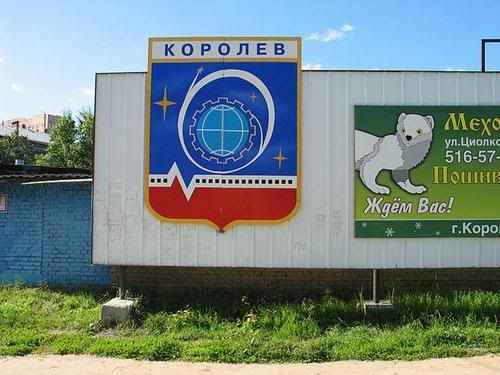
Korolyov, named after Sergei Korolyov, the renowned Soviet spacecraft engineer, is referred to as naukograd - which can be roughly translated as 'scienceville.' It's located about 20 minutes away from Moscow, and there's a very convenient bus service available from the VDNKh subway station.
The primary reason I went to Korolyov was that we'd just returned from Turkey then - and I really, really hated to be back. Normally, when I'm feeling this way, I like to spend some time pretending I'm just a tourist here: all the shit that I feel I'm doomed to spend the rest of my life in turns into something very temporary as soon as I switch into the tourist mode; I regain curiousity; I'm capable of seeing things again and finding them wondrous enough to enjoy. Sometimes this happy state lasts several weeks, sometimes - only a few days; I suspect it depends on how much energy I have to drag myself around, looking for the stuff I haven't seen yet or recently. (Another way to describe it: this is my way of being in denial.)
While in Korolyov, I was planning to visit Marina Tsvetayeva's dacha museum in Bolshevo, formerly a village, now part of Korolyov: this was a justification of the trip for the more alert part of me, the one that doesn't buy any of this 'tourist' escapism bullshit, but doesn't really mind cooperating, playing along.
***
Korolyov felt so-not-like-Moscow: small and sleepy, rather green.
It felt so very anachronistic - especially when I ran into a store selling moskovskiye tovary, Moscow goods. (Those who lived outside Moscow in the Soviet times, but did have a way to slip in every now and then, would know the feeling I'm talking about.)
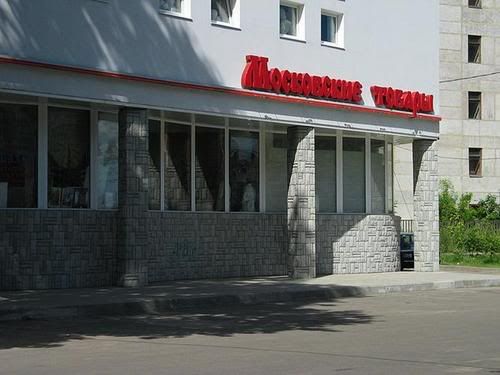
***
It felt like a different planet, too: only two old women knew where Tsvetayeva's museum was - and a few young ones that I asked for directions looked like they had no idea who Tsvetayeva was... (The museum turned out to have been closed since 2000.)
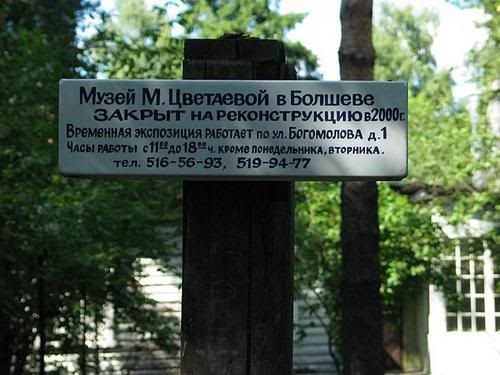
***
A bus stop at the edge of town, called Zhiliye Doma - "Residential Buildings"...
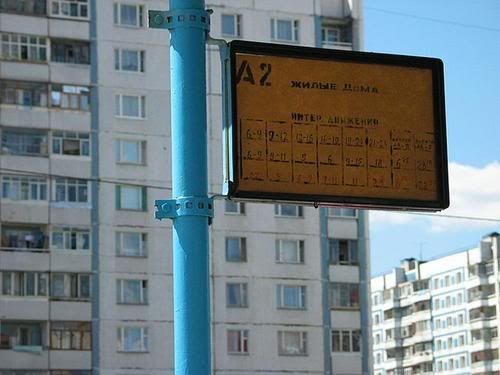
***
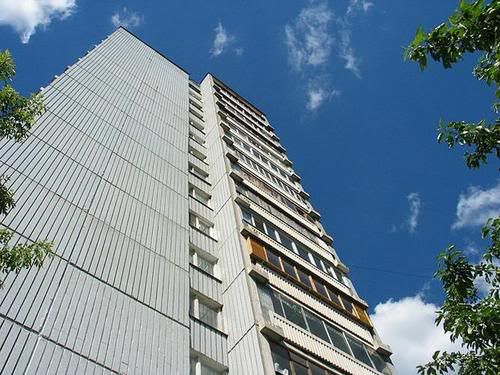
***
As I was taking this picture of the shoe-box garages in front of a "residential building," a man and a woman approached me and asked why I was photographing their garage... I think it turned me speechless for a while, and I felt like a spy, too, very uncomfortable. My reply was truly idiotic: I told them I found the garages beautiful (I just didn't have the guts to tell them the truth, to admit that the garages were hideous, beautifully hideous). The couple looked at me just like anyone else would in this situation - poor crazy pregnant girl, probably spent too much time in the sun; the woman said she thought the garages were ugly as hell, and they walked on home.
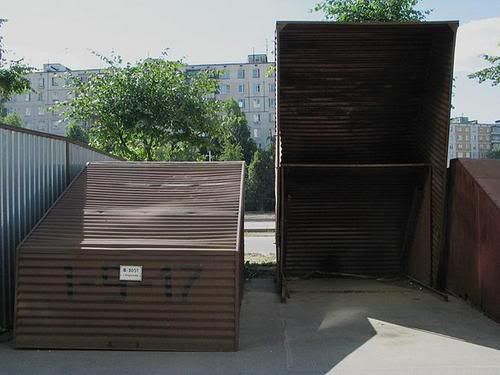
***
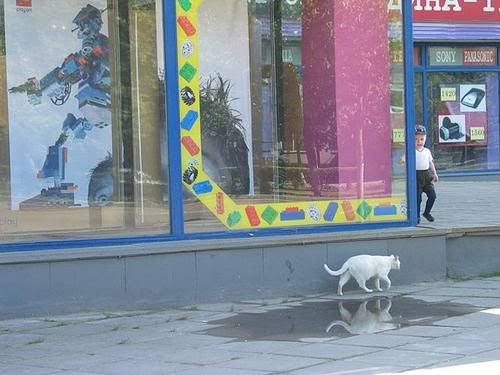
***
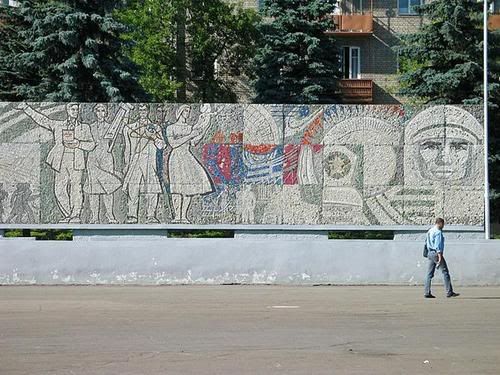

Korolyov, named after Sergei Korolyov, the renowned Soviet spacecraft engineer, is referred to as naukograd - which can be roughly translated as 'scienceville.' It's located about 20 minutes away from Moscow, and there's a very convenient bus service available from the VDNKh subway station.
The primary reason I went to Korolyov was that we'd just returned from Turkey then - and I really, really hated to be back. Normally, when I'm feeling this way, I like to spend some time pretending I'm just a tourist here: all the shit that I feel I'm doomed to spend the rest of my life in turns into something very temporary as soon as I switch into the tourist mode; I regain curiousity; I'm capable of seeing things again and finding them wondrous enough to enjoy. Sometimes this happy state lasts several weeks, sometimes - only a few days; I suspect it depends on how much energy I have to drag myself around, looking for the stuff I haven't seen yet or recently. (Another way to describe it: this is my way of being in denial.)
While in Korolyov, I was planning to visit Marina Tsvetayeva's dacha museum in Bolshevo, formerly a village, now part of Korolyov: this was a justification of the trip for the more alert part of me, the one that doesn't buy any of this 'tourist' escapism bullshit, but doesn't really mind cooperating, playing along.
***
Korolyov felt so-not-like-Moscow: small and sleepy, rather green.
It felt so very anachronistic - especially when I ran into a store selling moskovskiye tovary, Moscow goods. (Those who lived outside Moscow in the Soviet times, but did have a way to slip in every now and then, would know the feeling I'm talking about.)

***
It felt like a different planet, too: only two old women knew where Tsvetayeva's museum was - and a few young ones that I asked for directions looked like they had no idea who Tsvetayeva was... (The museum turned out to have been closed since 2000.)

***
A bus stop at the edge of town, called Zhiliye Doma - "Residential Buildings"...

***

***
As I was taking this picture of the shoe-box garages in front of a "residential building," a man and a woman approached me and asked why I was photographing their garage... I think it turned me speechless for a while, and I felt like a spy, too, very uncomfortable. My reply was truly idiotic: I told them I found the garages beautiful (I just didn't have the guts to tell them the truth, to admit that the garages were hideous, beautifully hideous). The couple looked at me just like anyone else would in this situation - poor crazy pregnant girl, probably spent too much time in the sun; the woman said she thought the garages were ugly as hell, and they walked on home.

***

***

And, according to Gazeta.ru (in Russian) and Channel 5, Valentyna Semenyuk, head of the State Property Fund, has resigned today.
Yesterday night, Semenyuk was hospitalized with high blood pressure. She did issue a decree, though, which allowed her first deputy, Oleksandr Bondar, to sign papers necessary for today's sale.
Tatyana Korobova wrote this in one of her recent columns (in Russian):
Recently, the Socialist Party of Ukraine, on whose quota Semenyuk had been appointed head of the State Property Fund, called her to resign and this way to protest privatization of Kryvorizhstal [...]. Socialists insist that the plant should remain the property of the state.
Yesterday night, Semenyuk was hospitalized with high blood pressure. She did issue a decree, though, which allowed her first deputy, Oleksandr Bondar, to sign papers necessary for today's sale.
Tatyana Korobova wrote this in one of her recent columns (in Russian):
[...] while the state, acting through the State Property Fund, guards this state property - runs Kryvorizhstal, that is - the head of the [State Property Fund], Valentyna Semenyuk, controls four intermediary companies that have stuck themselves to the [Kryvorizhstal] plant. [...]
Here's the latest on Kryvorizhstal, from the AP:
The world's largest steel producer, Mittal Steel Co., bought Ukraine's flagship steel plant Kryvorizhstal in a televised privatization auction Monday for more than $4.8 billion.
The high-stakes auction had been a campaign promise of President Viktor Yushchenko, part of his bid to prove to investors that the former Soviet republic is committed to transparency and open for foreign investment. Yushchenko was there to watch.
Mittal Steel bought the mill for 24.2 billion hryvna, well above what analysts had predicted and more than five times what former President Leonid Kuchma's son-in-law and another Ukrainian tycoon paid for the mill in 2004 - a sale Yushchenko called a theft.
The sale of Kryvorizhstal, which produces 20 percent of Ukraine's entire metal output, becomes the single largest foreign investment ever in this former Soviet republic.
Competing against Netherlands-based Mittal was the Industrial Group Consortium, which brings together the Industrial Union of Donbass and the world's second-largest steel producer, Luxembourg-based Arcelor SA, as well as the Ukraine-registered LLCSmart-Group.
The auction began with all three companies sticking sealed envelopes in a glass bin. State officials pried open the case and using scissors and sliced apart the envelopes to read the starting bids. The consortium linked to Arcelor had offered the highest starting price, 12.6 billion hryvna (about $2.5 million).
The sale then went to an open auction.
Bidding was feverish. Representatives of the three competing companies sat at separate desks and raised white placards to hike the price up in 100 million hryvna increments. The main bidding soon was between Mittal and the Arcelor consortium.
As the bidders raised the price, people in their teams frantically worked the phones. The mood was tense, with the auctioneer repeatedly going down to "one ... two ..." before a bidder stepped in and raised the price again.
Former Prime Minister Yulia Tymoshenko, who had spearheaded the privatization effort, flashed a huge smile when the bidding ended.
Saturday, October 22, 2005
If you google for Terek, you'll get a few mentions of the river and a gazillion of sites and news items on the football club.
But there's also a gas stove called Terek: an old Soviet thing someone from our building got rid of a few days ago...
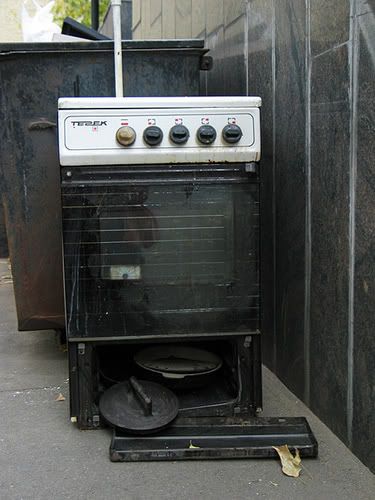

But there's also a gas stove called Terek: an old Soviet thing someone from our building got rid of a few days ago...


Friday, October 21, 2005
Don't forget to update whatever it is you keep to follow the mess that's Ukrainian politics:
Petro Poroshenko is one of the good guys again.
The prosecutor general's office spent three days looking into the case against him and determined that there had been nothing criminal in Poroshenko's actions.
More about it in English - here, at the Moscow News site.
Petro Poroshenko is one of the good guys again.
The prosecutor general's office spent three days looking into the case against him and determined that there had been nothing criminal in Poroshenko's actions.
More about it in English - here, at the Moscow News site.
You may not have noticed, but a couple of weeks ago my cute orange Haloscan comment boxes disappeared and were replaced with the rather boring-looking Blogger ones.
This switch occurred because, accidentally, I found out that Haloscan had changed the rules of the game, and to be able to have more than the last four months of comments on my blog, I'd have to pay them $12. As far as I know, they didn't send out a letter introducing this fee and warning about the consequences of not paying it - they just made a bunch of comments disappear from my blog.
Here's how they explain the situation on their forum:
Mishah has described it best, as a nice illustration of how Russian racket works, for those who aren't familiar: big thugs come into your store, break half of your stuff in there, announce the fee you are to pay them regularly from now on - why? because they are so great! - and leave you sitting there, contemplating the mess they've made and counting the costs.
I've lost some four months of comments (from late January, when I switched to Haloscan, to early June), but have rescued as much (July to October, about 200 of them), by copying and pasting each one of them into Blogger comment boxes. If I pay $12 to Haloscan and they return the missing stuff, I'd have to sit like an idiot again, restoring the order, transferring it all manually again.
It's not that I don't have $12. And I do value your comments a lot. But what if next time the Haloscan guys decide they want $50 and, to let everyone know, they'll "archive" (read: delete) everything again? You know, it's so much easier to just ask everyone who wants to comment to send me an email...
The wonderful thing about it all is that since I switched back to Blogger, all the old comments have come back, the ones that disappered when I left for Haloscan, the ones left on this blog during the Orange Revolution, over 300 of them!..
So, thank you, Blogger, and fuck you, Haloscan.
This switch occurred because, accidentally, I found out that Haloscan had changed the rules of the game, and to be able to have more than the last four months of comments on my blog, I'd have to pay them $12. As far as I know, they didn't send out a letter introducing this fee and warning about the consequences of not paying it - they just made a bunch of comments disappear from my blog.
Here's how they explain the situation on their forum:
[...]
1. Help! My old comments disappeared from Haloscan and my blog!
A: You're not a Premium member, are you? If you're not, all comments older than 4 months will be archived by Haloscan (NOT deleted). You cannot presently access these without becoming a Premium member. No, there is no other way.
2. Why should I pay US$12 to become a Premium member?
A: 'cos you'll be supporting a great commenting service that's been operating for zilch over the last what is it, twelve months? And because you'll get access to your old comments and heaps more. And 'cos you're a community-minded nice person ;-)
[...]
I really believe this needs to be added here.
Help my old Blogger/BlogSpot comments have disapeared!
These comments haven't gone, but are still store on the Blogger system. As Blogger and Haloscan are not linked, it is currently not possible for your comments to be transferred.
The only option available to you, if you wish to continue using Haloscan, is to manual copy and paste each comment across.
By upgrading to a premium member will NOT import these posts, however by becoming a premuim member you will be able to recover old Haloscan comments.
Mishah has described it best, as a nice illustration of how Russian racket works, for those who aren't familiar: big thugs come into your store, break half of your stuff in there, announce the fee you are to pay them regularly from now on - why? because they are so great! - and leave you sitting there, contemplating the mess they've made and counting the costs.
I've lost some four months of comments (from late January, when I switched to Haloscan, to early June), but have rescued as much (July to October, about 200 of them), by copying and pasting each one of them into Blogger comment boxes. If I pay $12 to Haloscan and they return the missing stuff, I'd have to sit like an idiot again, restoring the order, transferring it all manually again.
It's not that I don't have $12. And I do value your comments a lot. But what if next time the Haloscan guys decide they want $50 and, to let everyone know, they'll "archive" (read: delete) everything again? You know, it's so much easier to just ask everyone who wants to comment to send me an email...
The wonderful thing about it all is that since I switched back to Blogger, all the old comments have come back, the ones that disappered when I left for Haloscan, the ones left on this blog during the Orange Revolution, over 300 of them!..
So, thank you, Blogger, and fuck you, Haloscan.
Thursday, October 20, 2005
This fall has been a blessing, except for a few days of the smog. Almost no rains, very sunny and happy. Smog seemed to have turned into clouds a few days ago and got washed away with the rain. It's sunny again, though not very warm anymore.
Here're two photos of an Orthodox church near where we live that I took during my today's walk:
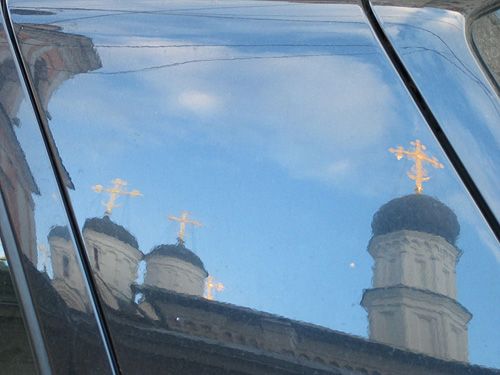
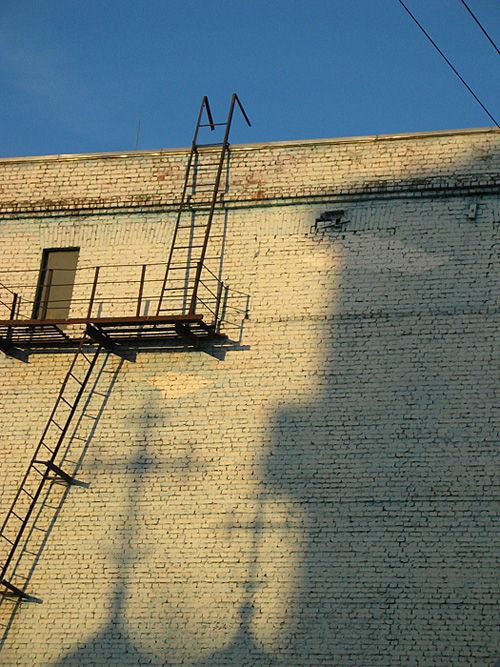
Here're two photos of an Orthodox church near where we live that I took during my today's walk:


Masha Gessen's Moscow Times column - A Battle Over a Bicycle - on the mess Moscow cops carry in their heads. Very nice.
Reminds me of a scene I witnessed a few weeks ago at Aleksandrovskiy Garden - is that what it's called? - a very touristy place, right next to the Kremlin wall.
Four young guys were practicing various dangerous movements on their bikes, using stairs way off the main pedestrian area. That, and it was a weekday, so there weren't many people around: if the guys suddenly and inexplicably lost control of their bikes, there'd be no one to maim except themselves.
Two cops, a guy and a girl, both wearing those tacky jackets made of the cheapest-looking, artificial leather, were riding absolutely beautiful, young horses along the pedestrian area. I was walking behind them, and it was all very sweet - until they noticed the bicycle guys: they sped up their horses quite theatrically, the male cop approached the teens from the front, while the female rode up to them from the rear. One of the boys managed to escape and stood at a distance, leaning on his bike and watching; the other three were trapped.
I didn't stop to watch, but I can only walk very slowly now, so I did see the male cop first talking to the boys, then checking their IDs. The female cop stayed guarding them from behind. Two boys didn't look old enough to have passports, and I wondered what they carried instead. A group of foreigners passed, staring and smiling.
The boys didn't look poor, their bicycles didn't look cheap, so maybe they paid the cops later to get rid of them - but I didn't see them doing it. Nor did I see them being accompanied to the police department, or leaving on their own. But it wasn't a joke - the cops had more than enough authority about them, and their horses provided them with some vertical advantage: the way they towered over the poor teens reminded me of The Lord of the Rings movies, hobbits and all.
Anyway, the boys didn't look like terrorists, and wasting time on them was just that: wasting time. They and their bicycles probably presented a slightly greater potential danger to the public than a tiny woman like Masha Gessen - but you'd have to be from a place as wonderful and peaceful as Iowa City to perceive them as danger - or from any other normal city, a city where there hasn't been anything like Nord-Ost theater siege (three years and three days ago...).
Reminds me of a scene I witnessed a few weeks ago at Aleksandrovskiy Garden - is that what it's called? - a very touristy place, right next to the Kremlin wall.
Four young guys were practicing various dangerous movements on their bikes, using stairs way off the main pedestrian area. That, and it was a weekday, so there weren't many people around: if the guys suddenly and inexplicably lost control of their bikes, there'd be no one to maim except themselves.
Two cops, a guy and a girl, both wearing those tacky jackets made of the cheapest-looking, artificial leather, were riding absolutely beautiful, young horses along the pedestrian area. I was walking behind them, and it was all very sweet - until they noticed the bicycle guys: they sped up their horses quite theatrically, the male cop approached the teens from the front, while the female rode up to them from the rear. One of the boys managed to escape and stood at a distance, leaning on his bike and watching; the other three were trapped.
I didn't stop to watch, but I can only walk very slowly now, so I did see the male cop first talking to the boys, then checking their IDs. The female cop stayed guarding them from behind. Two boys didn't look old enough to have passports, and I wondered what they carried instead. A group of foreigners passed, staring and smiling.
The boys didn't look poor, their bicycles didn't look cheap, so maybe they paid the cops later to get rid of them - but I didn't see them doing it. Nor did I see them being accompanied to the police department, or leaving on their own. But it wasn't a joke - the cops had more than enough authority about them, and their horses provided them with some vertical advantage: the way they towered over the poor teens reminded me of The Lord of the Rings movies, hobbits and all.
Anyway, the boys didn't look like terrorists, and wasting time on them was just that: wasting time. They and their bicycles probably presented a slightly greater potential danger to the public than a tiny woman like Masha Gessen - but you'd have to be from a place as wonderful and peaceful as Iowa City to perceive them as danger - or from any other normal city, a city where there hasn't been anything like Nord-Ost theater siege (three years and three days ago...).
Wednesday, October 19, 2005
Stefan at Dykun has started posting stories from his visit to Ternopil region - Tales from the Village 1: Beet Harvest in Pictures - such a wonderful break from Ukraine's rotten politics! (Be sure to click on the images to enlarge them.)
Via Abdymok, a boring text about Ukraine and Olena Prytula in Mother Jones, and a more informative piece about Serhiy Leshchenko at BBC News:
***
My own entries on Andriy Yushchenko scandal are here:
July 20 ... July 25 ... July 26 (1) ... July 26 (2) ... July 26 (3) ... July 27 (1) ... July 27 (2) ... July 28 (1) ... July 28 (2) ... July 28 (3) ... July 28 (4) ... July 28 (5) ... July 29 (1) ... July 29 (2) ... July 29 (3) ... August 2
***
What am I wasting my time on? I can't believe I've just spent 15 minutes sifting through my old posts, looking for mentions of Yushchenko's son... Must be the beginning of Part 2 of my 'nesting instinct' - gotta clean everything up, leaving no loose ends... Part 1 hit me two months ago...
[...]
Serhiy Leshchenko was not the only journalist shocked at such a response from the previously mildly spoken president, known for his gallant manners.
But it is perhaps unsurprising that in recent months a few articles on the Ukrainska Pravda website have been signed "Serhiy Stuffed-Face". [...]
***
My own entries on Andriy Yushchenko scandal are here:
July 20 ... July 25 ... July 26 (1) ... July 26 (2) ... July 26 (3) ... July 27 (1) ... July 27 (2) ... July 28 (1) ... July 28 (2) ... July 28 (3) ... July 28 (4) ... July 28 (5) ... July 29 (1) ... July 29 (2) ... July 29 (3) ... August 2
***
What am I wasting my time on? I can't believe I've just spent 15 minutes sifting through my old posts, looking for mentions of Yushchenko's son... Must be the beginning of Part 2 of my 'nesting instinct' - gotta clean everything up, leaving no loose ends... Part 1 hit me two months ago...
The timing of this Orhan Pamuk development is funny: I finished reading his Snow on Monday. Yes, it took me this long (I began reading the novel in Istanbul in January).
But it was different from the way it is with some books, those that are a torture to finish. I enjoyed Snow - it's just that every time something distracted me from the book, it was like I was leaving Turkey, just because I had to, difficult-but-what-can-I-do-about-it sort of thing, and while I was away (not reading), I knew that the country and my friends there (read: the city of Kars and the book's characters) continued to live their lives no better and no worse than when I was around, and when I had a chance to return to the book, it was like returning to Turkey - seeing everyone anew, learning of some things that had happened in my absense but remaining unaware of others, feeling totally happy about seeing some old faces and indifferent about others, knowing that I'd soon have to leave again but would likely find a way to come back.
Just like the real life.
***
Snow is a novel about religion and politics - and about so much more.
Politics in Snow is farce, theater, both literally and figuratively. The central event is a coup carried out by actors - a coup de théâtre, as one character calls it.
And:
The result is pathetic, of course, and so are the existing alternatives:
***
One way to remember the novel is as a play staged in a provincial theater: dim lighting throughout the show; snow effect is achieved with a single mirrored disco ball, a tacky thing, which also somehow serves to emphasize Kars' utter remoteness; background decorations have faded, but one can still distinguish a few formerly Armenian mansions in miserable condition, warm yellow light of the tea house windows, interrupted by dark male shadows of the unemployed, dozens of pale blue rectangles of the TV screens (the whole city is watching Marianna, a Latin American soap that used to be wildly popular in the former Soviet Union as well), a huge, low-quality reproduction of a tourist postcard of the unreachable Istanbul, and the undecipherable neon lights meant to represent Europe (aka Germany).
***
Religion in Snow is as much politics as it is theater:
As if 'to play' is the same as 'to be'. And as if to be a rebel or to pretend to be one is the same as to believe in God.
***
It may seem at first that the novel's central conflict is between atheism and religion, but, at a closer look, it turns out to be between the private and the public, one's freedom to be on his or her own vs. the oppressive judgment of the collective:
And roughly half the book later:
***
This would sound pompous, but Snow is a book you start reading hoping to learn something about Turkey - and you end up grasping something minor but quite universal.
***
Gazeta.ru ran a text yesterday on Pamuk and Snow (in Russian), by Andrei Kolesnikov, deputy editor-in-chief of the Izvestia daily and just a namesake of Andrei Kolesnikov who covers Putin for the Kommersant and wrote a book about the Orange Revolution earlier this year.
Here're two tiny fragments:
***
I was reading Snow when the bloody coup attempt was taking place in Nalchik last week, and I did think of the similarities between the fictional coup de théâtre and the real-life event: how weird, how unforeseen and how pointless both of them are.
Kolesnikov mentions Nalchik in his piece, too, only in a different context and in a way I can't really agree with:
***
More on Pamuk and Snow on this blog - here, here and, in yesterday's post, here.
But it was different from the way it is with some books, those that are a torture to finish. I enjoyed Snow - it's just that every time something distracted me from the book, it was like I was leaving Turkey, just because I had to, difficult-but-what-can-I-do-about-it sort of thing, and while I was away (not reading), I knew that the country and my friends there (read: the city of Kars and the book's characters) continued to live their lives no better and no worse than when I was around, and when I had a chance to return to the book, it was like returning to Turkey - seeing everyone anew, learning of some things that had happened in my absense but remaining unaware of others, feeling totally happy about seeing some old faces and indifferent about others, knowing that I'd soon have to leave again but would likely find a way to come back.
Just like the real life.
***
Snow is a novel about religion and politics - and about so much more.
Politics in Snow is farce, theater, both literally and figuratively. The central event is a coup carried out by actors - a coup de théâtre, as one character calls it.
...everyone in Kars could see the wisdom of regarding the 'staged coup' more as a strange theatrical event than a political one.
And:
'I know that you staged this coup not just for the sake of politics but also as a thing of beauty and in the name of art,' said Ka.
The result is pathetic, of course, and so are the existing alternatives:
'I'm glad I got to see with my own eyes how low the level of political understanding has sunk - young and old alike, they're hopeless. I went to this meeting to protest against this coup, but now I think the army is right to want to keep them out of politics. They're the dregs of society, the most wretched, muddled, brainless people in the city. I'm glad the army couldn't stand by and let us abandon our future to these shameless looters. I'll say this again, Kadife, before meddling with national politics, consider your actions carefully.'
***
One way to remember the novel is as a play staged in a provincial theater: dim lighting throughout the show; snow effect is achieved with a single mirrored disco ball, a tacky thing, which also somehow serves to emphasize Kars' utter remoteness; background decorations have faded, but one can still distinguish a few formerly Armenian mansions in miserable condition, warm yellow light of the tea house windows, interrupted by dark male shadows of the unemployed, dozens of pale blue rectangles of the TV screens (the whole city is watching Marianna, a Latin American soap that used to be wildly popular in the former Soviet Union as well), a huge, low-quality reproduction of a tourist postcard of the unreachable Istanbul, and the undecipherable neon lights meant to represent Europe (aka Germany).
***
Religion in Snow is as much politics as it is theater:
'To play the rebel heroine in Turkey , you don't pull off your scarf. You put it on.'
As if 'to play' is the same as 'to be'. And as if to be a rebel or to pretend to be one is the same as to believe in God.
***
It may seem at first that the novel's central conflict is between atheism and religion, but, at a closer look, it turns out to be between the private and the public, one's freedom to be on his or her own vs. the oppressive judgment of the collective:
'I want a God who doesn't ask me to take off my shoes in his presense, and who doesn't make me fall to my knees to kiss people's hands. I want a God who understands my need for solitude.'
'There is only one God,' said the sheikh. 'He sees everything, understands everyone. Even your need for solitude. If you believed in Him, if you knew He understood your need for solitude, you wouldn't feel so alone.'
And roughly half the book later:
'I think I may be starting to believe in God here,' said Ka with a smile. 'It's something I may be hiding even from myself.'
'You're deceiving yourself! Even if you did believe in God, it would make no sense to believe alone. You'd have to believe in Him as the poor do; you'd have to become one of them. It's only by eating what they eat, living where they live, laughing at the same jokes and getting angry whenever they do that you can believe in their God. If you're leading an utterly different life, you can't be worshipping the same God they are. God is just enough to know that it's not a question of reason or logic but how you live your life.
***
This would sound pompous, but Snow is a book you start reading hoping to learn something about Turkey - and you end up grasping something minor but quite universal.
***
Gazeta.ru ran a text yesterday on Pamuk and Snow (in Russian), by Andrei Kolesnikov, deputy editor-in-chief of the Izvestia daily and just a namesake of Andrei Kolesnikov who covers Putin for the Kommersant and wrote a book about the Orange Revolution earlier this year.
Here're two tiny fragments:
[...] The novel hasn't been translated into Russian because the translator of the renowned Turkish author died. This is great loss for the Russian readers, because Russia, just like Turkey, exists on the spot where civilizations meet, its fight against the co-existing national inferiority and superiority complexes is as futile, it is as submerged in religious confrontation with the 'materialistic' West, attempting to promote Orthodox Christianity to the status of the highest state value.
[...]
Orhan Pamuk [...] is the Russian Turkish writer who has ruthlessly deconstructed all possible Russian and Turkish complexes that have to do with our relationship with the Western civilization. For this - and for the truth - he is not loved. Maybe it's better not to translate Snow into Russian: the Islamists would wage jihad, the Orthodox Christians would anathemize the book, and supporters of sovereign democracy would file a libel lawsuit.
***
I was reading Snow when the bloody coup attempt was taking place in Nalchik last week, and I did think of the similarities between the fictional coup de théâtre and the real-life event: how weird, how unforeseen and how pointless both of them are.
Kolesnikov mentions Nalchik in his piece, too, only in a different context and in a way I can't really agree with:
[...]
At the same time, if translated, Snow could've become a textbook for those officers of the Russian special services who are willing to figure out the psychology of political Islamists. There's an Islamist underground in the novel similar to the one in Nalchik: until they begin to act directly, it's impossible to tell a peaceful civilian from a religious extremist. This metamorphosis occurs spontaneously and often incidentally, but there is a basis for it in the spiritual experience of radicalization of Islam and cultivation of the ideology of resistance to the West and to atheism.
[...]
***
More on Pamuk and Snow on this blog - here, here and, in yesterday's post, here.
Tuesday, October 18, 2005
Via Maud Newton, an article about Orhan Pamuk in the Guardian.
He is backing down, it seems:
I wish I knew the context of this remark better, but even without it, I feel I understand Pamuk: as one person, he has done and said more than enough, a lot more than the rest of them together, in a way - and it's nice to realize that he's not the suicidal type and knows when it's time to stop.
Then again, he could've been just straightening it all out, not retracting: it sucks to be misquoted and then given a three-year prison term.
***
The fear of "the word 'genocide'" seems so counterproductive. All the energy is being wasted on denial and ignoring, and at the same time so little publicity is given to the Cyprus issue, for example, so little being done to remind the world that it was Greece, not Turkey, that started the conflict in 1974:
As for the "we Turks killed this many Armenians" - well, if one says this, then it'd be nice if a Kurd came out, too, and spoke about the Kurdish role in the Genocide. And then all those millions who didn't kill anyone - if only because they were not yet born 90 years ago - should follow, declaring their innocence as loud as they can, because the notion of 'collective guilt' is a bullshit notion, very harmful. If 'collective guilt' is okay, then perhaps 'collective blame' is okay, too, right? But isn't 'collective blame' what usually leads to horrors like the Armenian Genocide?
***
Yashar Kemal wrote a wonderful novel about a Kurdish family caught in the midst of the horror of 1915 - Salman the Solitary.
I read it in 1998 and remember very little: most Kurds were killing Armenians in the Lake Van region, but the main character's family had the guts to save some; the main character's mother told him as she was dying never to settle in a home of someone who'd been chased away violently - she was speaking metaphorically, of a bird's nest, not a human dwelling - and her son, a respected man, later refused to take the best Armenian houses offered to him, and ended up with the worst plot of land available.
These are just the episodes that I remember; the novel's got many other dimensions.
More on Yashar Kemal is here, and here's also a bit from an old Amnesty International item - an illustration of how things like to repeat themselves:
He is backing down, it seems:
[...] But on Saturday night, he went on CNN-Turk television to say: "I did not say, we Turks killed this many Armenians. I did not use the word 'genocide'."
[...]
I wish I knew the context of this remark better, but even without it, I feel I understand Pamuk: as one person, he has done and said more than enough, a lot more than the rest of them together, in a way - and it's nice to realize that he's not the suicidal type and knows when it's time to stop.
Then again, he could've been just straightening it all out, not retracting: it sucks to be misquoted and then given a three-year prison term.
***
The fear of "the word 'genocide'" seems so counterproductive. All the energy is being wasted on denial and ignoring, and at the same time so little publicity is given to the Cyprus issue, for example, so little being done to remind the world that it was Greece, not Turkey, that started the conflict in 1974:
The agreement is in line with UN Security Council Resolution 353 demanding withdrawal of all unauthorised troops and seeks to restore the terms of the peace agreed in Nicosia in 1960, which established independence and power-sharing.
Greece breached the 1960 treaty ten days ago by instigating a coup against elected Cypriot president Archbishop Makarios.
Turkey responded by sending in troops, since the Greek puppet regime threatens its minority on the island.
As for the "we Turks killed this many Armenians" - well, if one says this, then it'd be nice if a Kurd came out, too, and spoke about the Kurdish role in the Genocide. And then all those millions who didn't kill anyone - if only because they were not yet born 90 years ago - should follow, declaring their innocence as loud as they can, because the notion of 'collective guilt' is a bullshit notion, very harmful. If 'collective guilt' is okay, then perhaps 'collective blame' is okay, too, right? But isn't 'collective blame' what usually leads to horrors like the Armenian Genocide?
***
Yashar Kemal wrote a wonderful novel about a Kurdish family caught in the midst of the horror of 1915 - Salman the Solitary.
I read it in 1998 and remember very little: most Kurds were killing Armenians in the Lake Van region, but the main character's family had the guts to save some; the main character's mother told him as she was dying never to settle in a home of someone who'd been chased away violently - she was speaking metaphorically, of a bird's nest, not a human dwelling - and her son, a respected man, later refused to take the best Armenian houses offered to him, and ended up with the worst plot of land available.
These are just the episodes that I remember; the novel's got many other dimensions.
More on Yashar Kemal is here, and here's also a bit from an old Amnesty International item - an illustration of how things like to repeat themselves:
[...]
In late October 1995 President Demirel approved amendments to Article 8 under which "separatist propaganda" remains an imprisonable offence, even when the defendant has in no way advocated violence, but the phrase "irrespective of the methods and aims and ideas" was removed. Maximum sentences were reduced from five to three years, and courts were given discretion to impose fines or suspended sentences for first offences. Most of those imprisoned under Article 8 were released pending retrial.
[...]
In 1995 Turkey's most renowned living writer, the novelist Yasar Kemal, was tried under Article 8 by Istanbul State Security Court for an article he had written for the German magazine Der Spiegel (The Mirror). He was acquitted. In protest at his prosecution, 1,080 intellectuals, writers, publishers and artists put their names to a book titled Freedom of Thought in Turkey, a collection of articles by people imprisoned or on trial for their writings. The government responded by charging 185 members of the group under Article 8. Those charged represent a major section of Turkey's literary and artistic elite. Their trials are continuing; the latest was opened in February 1996. On 7 March 1996 Yasar Kemal was given a 20-month suspended sentence for an essay titled "Dark Cloud over Turkey", his contribution to Freedom of Thought in Turkey. The conviction was for "inciting hatred" under Article 312, which has been used increasingly by prosecutors since the change to Article 8.
Monday, October 17, 2005
How sad and how outrageous.
A bunch of pictures posted at Maidan - pictures of an angry rally that took place at the Kyiv Pechersk Lavra on Oct. 14: people with Russian flags giving out leaflets advertising their upcoming Oct. 15 anti-UPA event on Khreshchatyk.
Lavra shouldn't be used this way - it's an important religious site, there's so much history there, a number of wonderful little museums and artists' studios scattered around - and it's such a beautiful place for a tranquil evening walk.
It's heartbreaking to see Lavra occupied by a mob of hateful phonies - and it's sickening to realize that a rally like this couldn't have taken place without the priests' permission. Moreover, the priests (those with the Ukrainian Orthodox Church, Moscow Patriarchy) are, most likely, encouraging this sort of pseudo-political action.
***
Tiny bits from Lavra's history are here and here.
Some photos from my walk in Lavra this past summer are here.
A bunch of pictures posted at Maidan - pictures of an angry rally that took place at the Kyiv Pechersk Lavra on Oct. 14: people with Russian flags giving out leaflets advertising their upcoming Oct. 15 anti-UPA event on Khreshchatyk.
Lavra shouldn't be used this way - it's an important religious site, there's so much history there, a number of wonderful little museums and artists' studios scattered around - and it's such a beautiful place for a tranquil evening walk.
It's heartbreaking to see Lavra occupied by a mob of hateful phonies - and it's sickening to realize that a rally like this couldn't have taken place without the priests' permission. Moreover, the priests (those with the Ukrainian Orthodox Church, Moscow Patriarchy) are, most likely, encouraging this sort of pseudo-political action.
***
Tiny bits from Lavra's history are here and here.
Some photos from my walk in Lavra this past summer are here.
Sunday, October 16, 2005
Via Notes From Kiev, a very nice text by Marina Lewycka in the Guardian - on Kyiv and the rest of Ukraine, and on finding her relatives there after 62 years: A Short History of Tracking Down My Family in Ukraine.
Reading the following passage after Yushchenko's delusional interview was just what I needed:
And here's something that made me laugh - driving habits and some people's idea of democracy:
***
Marina Lewycka is the author of A Short History of Tractors in Ukrainian; some of my notes on the book are here.
Reading the following passage after Yushchenko's delusional interview was just what I needed:
[...]
We turn off the highway at Zhashkiv, looking for directions to Monasterishche in a sleepy village where chickens cluck about on the road and cherry trees and hollyhocks grow in the front gardens. The cottages are freshly painted in traditional blue and white. No one is about.
A few kilometres down the road we pass an old lady trudging with two huge bags. She is wearing a black coat and a traditional headscarf low on her forehead. We offer her a lift. She beams and thanks us. Her gold front tooth gleams. She has walked 10km from the main highway, and has another 16 to go. She crosses herself and thanks the Lord for bringing us her way, then she starts to cry.
'You can't imagine how hard our life is in the village. There is no bus, no clinic, no school. No jobs. Nothing in the shop. They've just abandoned us to die.' When the collective farms were privatised, she tells us, everyone in the village was given a few hectares, but somehow most of it ended up in the hands of a 'beesnessmyen' from Kiev. The land is farmed through an agent who doesn't employ locals. The young people just sit around drinking.
We drop her off in front of another pretty white and blue cottage, which doesn't seem so idyllic any more. [...]
And here's something that made me laugh - driving habits and some people's idea of democracy:
[...] Yuri turns to me with a grin: 'Extreme travel.' 'Yes,' I smile weakly, hanging on to my seatbelt. Yuri is offended that I wear my seatbelt. He thinks seat belts are for ninnies. 'We live in democracy.'
[...]
***
Marina Lewycka is the author of A Short History of Tractors in Ukrainian; some of my notes on the book are here.
Questions to Yushchenko and the audio of his answers to a few of them during BBC's Talking Point today are here.
A synopsis of the interview is here.
(I wonder if they are going to post the transcript anytime soon.)
***
To me, Yushchenko sounded more realistic - and thus more convincing - when he spoke on Ukraine's foreign policy.
As for the domestic affairs, here's one quote:
And the way he dealt with the question on his recent deal with Yanukovych - he made it sound as if the country was on the verge of a break-up again (just like it had been a year ago - thanks to Yanukovych and others who convened with him in Severodonetsk), and if, to avert the catastrophe, he had to speak with the opposition, he would.
Ludicrous.
A synopsis of the interview is here.
(I wonder if they are going to post the transcript anytime soon.)
***
To me, Yushchenko sounded more realistic - and thus more convincing - when he spoke on Ukraine's foreign policy.
As for the domestic affairs, here's one quote:
And besides, in the last nine months most people's personal income has grown by 24 percent - we have never had that before! For the first time in 14 years, pensioners get enough money - you won't see a pensioner rummaging in dustbins anymore, and that is, surely, very important.
And the way he dealt with the question on his recent deal with Yanukovych - he made it sound as if the country was on the verge of a break-up again (just like it had been a year ago - thanks to Yanukovych and others who convened with him in Severodonetsk), and if, to avert the catastrophe, he had to speak with the opposition, he would.
Ludicrous.
Looks like it's impossible to make an online donation to the Edhi Foundation if your credit card was issued to you in Russia or Ukraine - these two countries (and, I'm sure, a bunch of others as well) are not listed in the drop-down country menu.
Someone should let them know.
With the Human Development Foundation, it works perfectly well.
Someone should let them know.
With the Human Development Foundation, it works perfectly well.
Saturday, October 15, 2005
Several photos of the UPA (Ukrainian Insurgent Army) veterans marching on Khreshchatyk today are here, and of their opponents - here.
A EuroNews video of todays' ugly clashes is here.
***
Via Kiev Ukraine News Blog, a wonderful photo of a cute young cop and an UPA veteran with a portrait of Stepan Bandera:
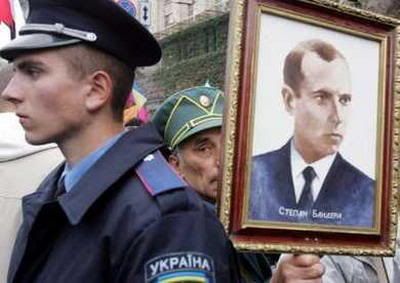
Photo: Reuters/Gleb Garanich
At first, the cop and Bandera looked like twins to me. Amazing. It's their eyes, I guess.
A EuroNews video of todays' ugly clashes is here.
***
Via Kiev Ukraine News Blog, a wonderful photo of a cute young cop and an UPA veteran with a portrait of Stepan Bandera:

Photo: Reuters/Gleb Garanich
At first, the cop and Bandera looked like twins to me. Amazing. It's their eyes, I guess.
A story on Russia's political youth movements in this week's Ogoniok (in Russian).
Here's the beginning of the segment on the National Bolshevik Party (NBP):
On the photo, however, Eduard Limonov, 63, is posing underneath a portrait of Stalin - and looks like nothing but an old fart.
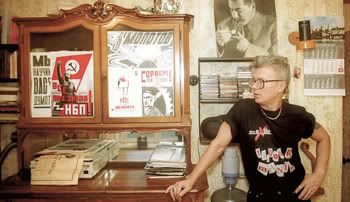
Photo: Sergei Leontiev
***
More on NBP - here.
Here's the beginning of the segment on the National Bolshevik Party (NBP):
Formally, the age of the party's leader is not that of a child, but Limonov will forever remain "the adolescent Savenko" and NBP - the party of the young.
On the photo, however, Eduard Limonov, 63, is posing underneath a portrait of Stalin - and looks like nothing but an old fart.

Photo: Sergei Leontiev
***
More on NBP - here.
 Another option for those willing to support earthquake victims and the relief effort in Pakistan: donate online to the Human Development Foundation (HDF).
Another option for those willing to support earthquake victims and the relief effort in Pakistan: donate online to the Human Development Foundation (HDF).More on the HDF at 3 Quarks Daily.
***
More info and links in an earlier entry, here.
Friday, October 14, 2005
A friend has forwarded me a link to the Russian Chronicles, a travel blog by Lisa Dickey and photographer David Hillegas (the archive is here). They are moving from Vladivostok to St. Petersburg, re-visiting places and people that Lisa and another photographer, Gary Matoso, encountered on their trip across Russia ten years ago, in 1995. That journey has been documented here.
A truly exciting project. I've read only one entry so far, and already I wish I could do something similar as well. (When I think more about it, though, I'm beginning to feel claustrophobic: if all goes well - inshaallah - there's no way I'll be able to accomplish anything like this anytime soon...)
A truly exciting project. I've read only one entry so far, and already I wish I could do something similar as well. (When I think more about it, though, I'm beginning to feel claustrophobic: if all goes well - inshaallah - there's no way I'll be able to accomplish anything like this anytime soon...)
Peter Byrne wrote this past Monday that Svyatoslav Piskun would be dismissed very soon:
It happened much sooner, though: today.
According to Ukrainska Pravda (in Ukrainian), Oleg Rybachuk, head of the presidential secretariat, had this comment on Yushchenko's decision:
***
On a different note, Peter Byrne has just been denied a Russian entry visa.
Some background is here.
prosecutor general svyatoslav pyskun is on his way out the door, according to bob, who thinks pizza face will jettison the clown in the upcoming couple of weeks.
good riddance!
It happened much sooner, though: today.
According to Ukrainska Pravda (in Ukrainian), Oleg Rybachuk, head of the presidential secretariat, had this comment on Yushchenko's decision:
Svyatoslav Mykhailovych [Piskun] has been so hyper lately, he's opened so many cases... We've made sure he doesn't accidentally open a case against himself.
***
On a different note, Peter Byrne has just been denied a Russian entry visa.
Some background is here.
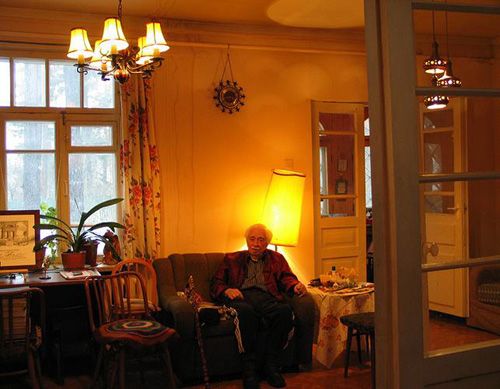
March 19, 2004
Rest in peace, Oleg Lundstrem...
He died today, at the age of 89. His bio is here, at his legendaty orchestra's homepage.
A couple more 2004 photos of Oleg Lundstrem at his dacha are on my photo page, here.
***
Update: NTV has just said that Oleg Lundstrem's father was a Swede - and his mother a descendant of Taras Shevchenko!
Thursday, October 13, 2005
Disclaimer: This entry contains generalizations, is actually full of them.
The morning rush hour crowd on Moscow subway is different from the daytime crowd: at 8:30 am, people are tougher, more determined to sleep through the ride, totally oblivious to anyone else's presence.
It's a funny feeling to be standing over a young man, squeezed from three sides and with my belly almost touching him on the fourth, trying not to look him in the eye, as he sits there, looking sideways, too, until it's time for him to get out.
'A girly man' is the kindest name I have for someone like that.
In this part of the world, men often act as if they've got no wives, sisters, daughters and/or mothers - but, of course, they do, and then they're upset when other men treat their female relatives like shit.
On Moscow subway, young women offer me a seat more often than men do. It does feel embarrassing (or did, when my belly was smaller), but it's healthier to sit than to stand, so in order not to depend on the kindness of strangers, I always try to be the first one to enter the car and head for what may be the only vacant seat as if my life depended on it.
It's a reflex already. Once, a few months ago, I had to stand, waiting for my turn at the clinic; when a man got up to get himself a glass of water from the cooler a meter away, I made a couple of wide steps and took his chair within seconds. He didn't say a word, just stood there, drinking his water, and, after a minute or so, I suddenly realized I'd just done something totally inappropriate. I got up and apologized, explaining this was how I usually acted on the subway and that it all just got mixed up in my head somehow. The man smiled and told me not to worry.
***
Not as many generalizations as I expected I'd have when I returned from the clinic this morning, mad as hell.
So here's one more, by way of compensation, irrelevant to the beginning of this post: maternity hospitals in this part of the world are so gloomy, it's not surprising every second person here looks clinically depressed. The way we're born isn't too different from the way we live.
The morning rush hour crowd on Moscow subway is different from the daytime crowd: at 8:30 am, people are tougher, more determined to sleep through the ride, totally oblivious to anyone else's presence.
It's a funny feeling to be standing over a young man, squeezed from three sides and with my belly almost touching him on the fourth, trying not to look him in the eye, as he sits there, looking sideways, too, until it's time for him to get out.
'A girly man' is the kindest name I have for someone like that.
In this part of the world, men often act as if they've got no wives, sisters, daughters and/or mothers - but, of course, they do, and then they're upset when other men treat their female relatives like shit.
On Moscow subway, young women offer me a seat more often than men do. It does feel embarrassing (or did, when my belly was smaller), but it's healthier to sit than to stand, so in order not to depend on the kindness of strangers, I always try to be the first one to enter the car and head for what may be the only vacant seat as if my life depended on it.
It's a reflex already. Once, a few months ago, I had to stand, waiting for my turn at the clinic; when a man got up to get himself a glass of water from the cooler a meter away, I made a couple of wide steps and took his chair within seconds. He didn't say a word, just stood there, drinking his water, and, after a minute or so, I suddenly realized I'd just done something totally inappropriate. I got up and apologized, explaining this was how I usually acted on the subway and that it all just got mixed up in my head somehow. The man smiled and told me not to worry.
***
Not as many generalizations as I expected I'd have when I returned from the clinic this morning, mad as hell.
So here's one more, by way of compensation, irrelevant to the beginning of this post: maternity hospitals in this part of the world are so gloomy, it's not surprising every second person here looks clinically depressed. The way we're born isn't too different from the way we live.
Something not pretty is going on in Nalchik, the capital of Kabardino-Balkaria. A BBC story is here, and I hope it'll be over with as few casualties as possible before I find it in me to figure out who's fighting who beyond the usual "bandits vs the federal forces."
Wednesday, October 12, 2005
Roddom #25 (6 Fotievoy St., m. Leninsky Prospekt) - a scary place, squeezed behind a huge construction site; two very tall buildings are being erected right next to the hospital, 50 or so meters away from it - 47 photos:
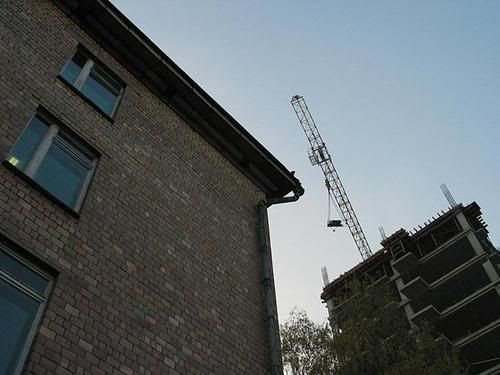
***
Some more Armenian writing on the wall, this time both in Armenian and Russian, and a drawing of Mount Ararat, next to the little girl's name, Meline! (And while I was walking around, taking pictures, a serious-looking Armenian man stood by the hospital building, talking to his wife (or sister) up on the third floor. I even recognized a few Armenian words I used to know a long, long time ago!)
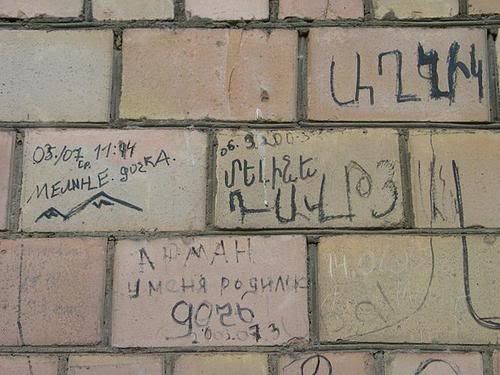
***
Stuff that covers the roddom walls reminds me a little of the post office building in Kyiv a year ago, which, in its turn, used to remind us all of Reichstag in May 1945.
Joy that has to be documented somehow.
***
Smog has gotten really bad and I can't write anymore now.

***
Some more Armenian writing on the wall, this time both in Armenian and Russian, and a drawing of Mount Ararat, next to the little girl's name, Meline! (And while I was walking around, taking pictures, a serious-looking Armenian man stood by the hospital building, talking to his wife (or sister) up on the third floor. I even recognized a few Armenian words I used to know a long, long time ago!)

***
Stuff that covers the roddom walls reminds me a little of the post office building in Kyiv a year ago, which, in its turn, used to remind us all of Reichstag in May 1945.
Joy that has to be documented somehow.
***
Smog has gotten really bad and I can't write anymore now.
I've just posted 36 photos from the two Moscow maternity hospitals I've visited so far. I hope to have more notes and some translations later.
- Roddom #10
22 Azovskaya St., m. Kakhovskaya - 12 photos:
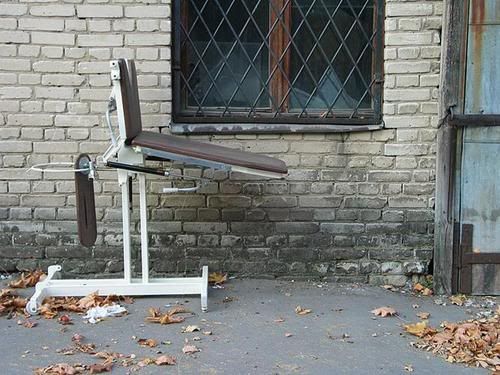
- Roddom of the Clinical Hospital #29
2 Gospitalnaya Sq., m. Aviamotornaya - 24 photos:
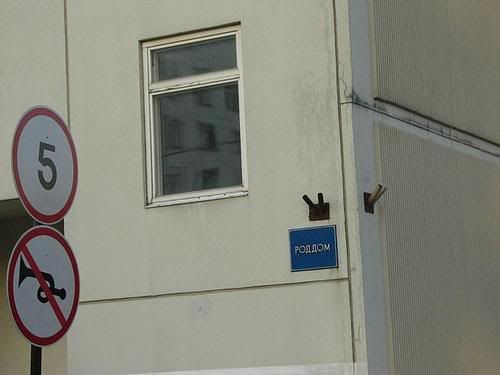
***
Both series end with greeting messages that happy fathers, other relatives and friends leave on the roddom walls and on the ground beneath the new mamas' windows. My favorite is by some Armenian guy who was so overjoyed he was climbing the walls, scribbling his son's name, Ashot, everywhere he could: "Kristina gave birth to Ashot, 2000" ('gave birth' is misspelled - radila instead of rodila)...
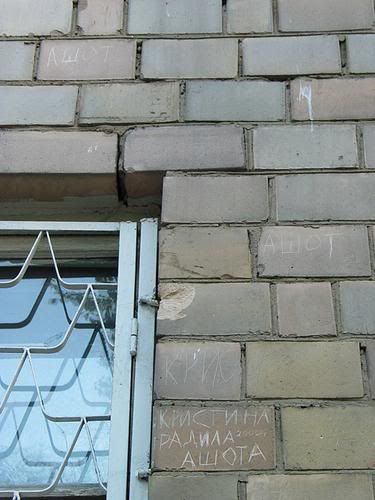
- Roddom #10
22 Azovskaya St., m. Kakhovskaya - 12 photos:

- Roddom of the Clinical Hospital #29
2 Gospitalnaya Sq., m. Aviamotornaya - 24 photos:

***
Both series end with greeting messages that happy fathers, other relatives and friends leave on the roddom walls and on the ground beneath the new mamas' windows. My favorite is by some Armenian guy who was so overjoyed he was climbing the walls, scribbling his son's name, Ashot, everywhere he could: "Kristina gave birth to Ashot, 2000" ('gave birth' is misspelled - radila instead of rodila)...

Tuesday, October 11, 2005
I've been preoccupied with my pregnancy for the past few days, and that kept me from writing.
The third trimester is tougher than I could imagine; the toughest moments include trying to decide where to deliver the baby; keeping myself from reading too many horror stories about giving birth; trying not to whine to anyone who'd listen, thus directing most of it at poor Mishah; being exhausted and restless at once; growing heavier and heavier; being insomniac again. Oh, and living in Moscow through it all.
Yesterday, I got stuck in a terrible traffic jam - just because some inner devil forced me to buy six overripe hurma (persimmon) fruits. I was on my way from the second maternity hospital I'd chosen to inspect, and I was almost by the subway when I saw a market. I stopped and bought hurma, joyfully, for the first time this year. Then I realized it was 6 p.m., the rush hour. With the very soft hurma in a plastic bag and with my belly, it would've been problematic to squeeze inside the station, let alone the train. So I got myself a cab and spent the next hour and a half in it. Could have taken a plane and flown to Kyiv instead. There's a good Ukrainian proverb: Za durnoyu golovoyu i nogam nema pokoyu - 'Because of the silly head, the legs don't get any rest.' It's about me.
Today, Moscow's air has been replaced with smog. It's not as bad as in 2002, but I wasn't 33 weeks pregnant then, either.
To make things even worse, folks at the synagogue across the street have been slaughtering chickens and God knows what else for Yom Kippur all day today. That's unbearable. They've built something of a shed outside, which probably prevents people walking down the street from seeing it - but the sounds coming from over there are horrible. For me to feel traumatized, it's enough to see a dozen or so stray dogs running around our neighborhood - and now this. I love to watch rooftop weddings at the synagogue, I don't find them intrusive at all; I also love the sound of church bells and the Muslim azan - but hearing poor animals scream all day long really, really hurts.
***
To end this on a very happy note, the ultrasound doctor has finally been able to determine the baby's sex: it's a girl!!! The name we'd chosen long before I got pregnant is Marta - Marta Smetana. (She's in a breech position, though, and that's not good, but I do hope she'll turn around when it's time for her to be born, inshaallah.)
***
Later today, I'll post photos of the Moscow maternity hospitals I've checked out already, two of them. I haven't been inside, but some stuff outdoors seemed pretty vivid, too.
The third trimester is tougher than I could imagine; the toughest moments include trying to decide where to deliver the baby; keeping myself from reading too many horror stories about giving birth; trying not to whine to anyone who'd listen, thus directing most of it at poor Mishah; being exhausted and restless at once; growing heavier and heavier; being insomniac again. Oh, and living in Moscow through it all.
Yesterday, I got stuck in a terrible traffic jam - just because some inner devil forced me to buy six overripe hurma (persimmon) fruits. I was on my way from the second maternity hospital I'd chosen to inspect, and I was almost by the subway when I saw a market. I stopped and bought hurma, joyfully, for the first time this year. Then I realized it was 6 p.m., the rush hour. With the very soft hurma in a plastic bag and with my belly, it would've been problematic to squeeze inside the station, let alone the train. So I got myself a cab and spent the next hour and a half in it. Could have taken a plane and flown to Kyiv instead. There's a good Ukrainian proverb: Za durnoyu golovoyu i nogam nema pokoyu - 'Because of the silly head, the legs don't get any rest.' It's about me.
Today, Moscow's air has been replaced with smog. It's not as bad as in 2002, but I wasn't 33 weeks pregnant then, either.
To make things even worse, folks at the synagogue across the street have been slaughtering chickens and God knows what else for Yom Kippur all day today. That's unbearable. They've built something of a shed outside, which probably prevents people walking down the street from seeing it - but the sounds coming from over there are horrible. For me to feel traumatized, it's enough to see a dozen or so stray dogs running around our neighborhood - and now this. I love to watch rooftop weddings at the synagogue, I don't find them intrusive at all; I also love the sound of church bells and the Muslim azan - but hearing poor animals scream all day long really, really hurts.
***
To end this on a very happy note, the ultrasound doctor has finally been able to determine the baby's sex: it's a girl!!! The name we'd chosen long before I got pregnant is Marta - Marta Smetana. (She's in a breech position, though, and that's not good, but I do hope she'll turn around when it's time for her to be born, inshaallah.)
***
Later today, I'll post photos of the Moscow maternity hospitals I've checked out already, two of them. I haven't been inside, but some stuff outdoors seemed pretty vivid, too.
Some resources and ways to help South Asian earthquake victims:
- Donate online via the Association for the Development of Pakistan (ADP). So far, ADP seems to offer the only way to make an online donation to Edhi Foundation:
Among other options listed on the ADP site are Oxfam and The International Federation of Red Cross and Red Crescent Societies.
- A lot more information is here, at InsanityWorks.org: ways to donate money, goods and blood, as well as news and resources on the earthquake-affected areas and the relief effort.
- A very comprehensive resource on relief organizations accepting donations online - Network for Good.
- BBC has a regularly updated page on the earthquake - South Asia Quake - with eyewitness and survivor accounts, photos and news.
- Earthquake updates at Dawn.com; here's one of the latest items:
- Blogs:
South Asia Quake Help
Pakistan Earthquake 2005
Chapati Mystery
Avari-Nameh
- Donate online via the Association for the Development of Pakistan (ADP). So far, ADP seems to offer the only way to make an online donation to Edhi Foundation:
ADP has selected the Edhi Foundation to receive funds because of its long history as a reputable, transparent organization, as well as its strong network in the Northern Areas and current mobilization. "Edhi Foundation is providing food, coffins and blankets to the affected people through its centers in Muzaffarabad, Mansehra and Rawalkot . We ask you to please give generously to ADP's online collection effort in this time of need." - Edhi New York Office.
Among other options listed on the ADP site are Oxfam and The International Federation of Red Cross and Red Crescent Societies.
- A lot more information is here, at InsanityWorks.org: ways to donate money, goods and blood, as well as news and resources on the earthquake-affected areas and the relief effort.
- A very comprehensive resource on relief organizations accepting donations online - Network for Good.
- BBC has a regularly updated page on the earthquake - South Asia Quake - with eyewitness and survivor accounts, photos and news.
- Earthquake updates at Dawn.com; here's one of the latest items:
Pakistan battling huge odds to deliver quake aid MUZAFFARABAD, Azad Kashmir, Oct 11 (AFP) - Pakistan was Tuesday battling huge odds to deliver aid to hungry and traumatised people marooned in the northeastern mountains after the weekend earthquake which killed up to 40,000 people. The authorities estimate over two million people were made homeless by Saturday's 7.6 magnitude quake which obliterated whole towns and villages in Azad Kashmir. Over 60,000 were injured, many seriously. Sporadic looting broke out in the main Kashmiri town of Muzaffarabad as anger over the slow delivery of aid boiled over, but the overwhelmed government insisted it was moving as fast as possible. Military spokesman Major General Shaukat Sultan said late Monday the roads into the two worst-hit towns -- Muzzafarabad and Balakot -- had finally been cleared of landslides and relief trucks could begin arriving in numbers. Survivors were facing an array of problems -- freezing overnight temperatures, rain, landslides, scarce food, little shelter, no communications networks and almost non-existent healthcare. (Posted @ 09:20 PST)
- Blogs:
South Asia Quake Help
Pakistan Earthquake 2005
Chapati Mystery
Avari-Nameh
Thursday, October 06, 2005
Serhiy Holovaty has been appointed minister of justice of Ukraine.
Just as with Yekhanurov, I remember a tiny little bit about Holovaty from his first term as justice minister (1995-1997). It's sort of untranslatable, though.
He once announced on TV, very seriously, that he was going to rename the ministry of justice into something that sounded very much like the Ministry of Truth: instead of Ministerstvo Yustytsii Ukraine would get Ministerstvo Spravedlyvosti.
(To me, both words - yustytsiya and spravedlyvist' - mean 'justice' in English, but I'm sure there's a way to somehow distinguish between the two. The former is a legal term, while the latter has, in this context, little but emotive connotation.)
Anyway, this is the only relevant thing I remember about Holovaty - and it is hard for me to take him too seriously because of that.
Last month, when they were voting for Yekhanurov as prime minister, Holovaty dissented from the rest of his faction, Yulia Tymoshenko Bloc, and voted for, not against, Yushchenko's candidate. I've really no idea what to make of him - but I do hope he won't act as notoriously silly as Roman Zvarych did.
Just as with Yekhanurov, I remember a tiny little bit about Holovaty from his first term as justice minister (1995-1997). It's sort of untranslatable, though.
He once announced on TV, very seriously, that he was going to rename the ministry of justice into something that sounded very much like the Ministry of Truth: instead of Ministerstvo Yustytsii Ukraine would get Ministerstvo Spravedlyvosti.
(To me, both words - yustytsiya and spravedlyvist' - mean 'justice' in English, but I'm sure there's a way to somehow distinguish between the two. The former is a legal term, while the latter has, in this context, little but emotive connotation.)
Anyway, this is the only relevant thing I remember about Holovaty - and it is hard for me to take him too seriously because of that.
Last month, when they were voting for Yekhanurov as prime minister, Holovaty dissented from the rest of his faction, Yulia Tymoshenko Bloc, and voted for, not against, Yushchenko's candidate. I've really no idea what to make of him - but I do hope he won't act as notoriously silly as Roman Zvarych did.
So I keep thinking about that New York Times text by Nicholas Kulish, and here's why:
All this corruption is really maddening, yes, but one thing I'd really like to know is the name and title of the border guy who broke that CD player and prohibited a foreign citizen from leaving Ukraine. Also, names and titles of the guys who pocketed Mr. Kulish's money 30 hours later.
I want the whole world to know their names and the names of the border stations they serve: I do feel shamed for my country, and I want them to feel as lousy - and maybe to lose their jobs as well.
Getting their names might have been difficult, but not impossible. Moreover, a mere attempt could've helped Mr. Kulish to get the hell out of Ukraine.
I assume he was traveling without a fixer, translator or anyone else who knew how to speak with the border guys in the language and manner they understood, someone who knew how to remind the assholes that they were not irreplaceable in the country full of unemployed people. This may be tough to accomplish even for the locals, and much more so for a foreigner.
But I also assume that Mr. Kulish is a U.S. citizen (despite his Ukrainian last name). Imagine a truly ridiculous situation in which a U.S. citizen is doomed to spend the rest of his life in the middle of nowhere just because a Ukrainian border guard wouldn't let him out. Imagine that this U.S. citizen is not aware of any other border station nearby - or that he's out of gas and money, unable or unwilling to drive around like an idiot for the next 30 hours. Imagine this U.S. citizen's next step: he'd probably want to call the U.S. embassy and ask the folks over there about his options. In the course of his conversation with the embassy, he'd probably want to name the Ukrainian official who was basically keeping him hostage at the border. Maybe the embassy people would like to speak with the corrupt sonuvabitch themselves and explain to him a few things about norms of international law - or remind him of the existence of his superiors.
Who knows, maybe the border control guy would suddenly realize just how vulnerable he is - and then he'd apologize and let Mr. Kulish drive on into Moldova.
I don't want to appear arrogant or imply that this scenario is absolutely realistic: in this situation, I'd probably be too frustrated, shocked or scared myself to think clearly.
But I really feel that we could use some help in fighting our famous corruption - and getting the bastards' names, titles and locations into the New York Times and the International Herald Tribune would have taught them something.
[...] But I grasped its meaning a few months later as I sat at a Ukrainian border station in a beat-up Volkswagen Golf, trying to cross into Moldova.
"Present? Present?" the border guard asked, holding up my CD player. His comrades were inside our car, searching every nook and cranny. I smiled and told the guard I didn't understand. He smiled back, gave the player a whack with his billy club and permitted me to keep my broken Discman. Then we were inexplicably told we couldn't leave the country. In retrospect, I might as well have given it to him. It could have saved me 30 hours of desperate searching, through the night and into the following day, for a station where the border police would let us pass without stealing our car or demanding a bribe higher than we were willing to pay. The asking price at the next stop was $200, a lot more than I paid for the CD player.
[...]
All this corruption is really maddening, yes, but one thing I'd really like to know is the name and title of the border guy who broke that CD player and prohibited a foreign citizen from leaving Ukraine. Also, names and titles of the guys who pocketed Mr. Kulish's money 30 hours later.
I want the whole world to know their names and the names of the border stations they serve: I do feel shamed for my country, and I want them to feel as lousy - and maybe to lose their jobs as well.
Getting their names might have been difficult, but not impossible. Moreover, a mere attempt could've helped Mr. Kulish to get the hell out of Ukraine.
I assume he was traveling without a fixer, translator or anyone else who knew how to speak with the border guys in the language and manner they understood, someone who knew how to remind the assholes that they were not irreplaceable in the country full of unemployed people. This may be tough to accomplish even for the locals, and much more so for a foreigner.
But I also assume that Mr. Kulish is a U.S. citizen (despite his Ukrainian last name). Imagine a truly ridiculous situation in which a U.S. citizen is doomed to spend the rest of his life in the middle of nowhere just because a Ukrainian border guard wouldn't let him out. Imagine that this U.S. citizen is not aware of any other border station nearby - or that he's out of gas and money, unable or unwilling to drive around like an idiot for the next 30 hours. Imagine this U.S. citizen's next step: he'd probably want to call the U.S. embassy and ask the folks over there about his options. In the course of his conversation with the embassy, he'd probably want to name the Ukrainian official who was basically keeping him hostage at the border. Maybe the embassy people would like to speak with the corrupt sonuvabitch themselves and explain to him a few things about norms of international law - or remind him of the existence of his superiors.
Who knows, maybe the border control guy would suddenly realize just how vulnerable he is - and then he'd apologize and let Mr. Kulish drive on into Moldova.
I don't want to appear arrogant or imply that this scenario is absolutely realistic: in this situation, I'd probably be too frustrated, shocked or scared myself to think clearly.
But I really feel that we could use some help in fighting our famous corruption - and getting the bastards' names, titles and locations into the New York Times and the International Herald Tribune would have taught them something.
Wednesday, October 05, 2005
It hurts to read stuff like this, but the more of it, the better. What's important is that it's common sense, reality - not ill-wishing. For things to begin changing, the whole country has to be in the spotlight, not just its "heroes," Yushchenko and Tymoshenko.
Driving the Scenic Route to European Union Membership, by Nicholas Kulish, in the New York Times:
(This reminds me of the end of 2000, when we were Luhansk: quite a number of local business people complained about how fucked-up their region was, how difficult it was to do business there. "Everyone's calling [the neighboring] Donetsk region [run by Yanukovych then] the most corrupt in Ukraine - but no, compared to us here, it's like paradise over there, like a foreign country!" Judging by some of the most bizarre obstacles that we ran into during that Luhansk trip, I am still inclined to believe what those people said.)
Driving the Scenic Route to European Union Membership, by Nicholas Kulish, in the New York Times:
[...]
We cheered out loud, in an almost tearful swell of relief, as we re-entered civilization, crossing the border into Romania. Romania, another former Communist dictatorship is my idea of civilization? The answer is absolutely, because of that tiny little blue flag with yellow stars - the banner of the European Union - at the crossing point. Let me be clear: Romania is not yet a member, and still the contrast with a country like Ukraine was night and day. What had been an hourly ritual of bribes, doling out the three C's - cash, Coke and cigarettes - to machine pistol-wielding cops, abruptly ended.
[...]
(This reminds me of the end of 2000, when we were Luhansk: quite a number of local business people complained about how fucked-up their region was, how difficult it was to do business there. "Everyone's calling [the neighboring] Donetsk region [run by Yanukovych then] the most corrupt in Ukraine - but no, compared to us here, it's like paradise over there, like a foreign country!" Judging by some of the most bizarre obstacles that we ran into during that Luhansk trip, I am still inclined to believe what those people said.)
Tuesday, October 04, 2005
Way too many people are coming here looking for the Oct. 2 wedding of Evgenia Tymoshenko and Sean Carr - but all they're getting is a three-month-old Times piece about it...
So here's more stuff:
- from the Guardian - Ukraine's wedding of the year;
- from the Times - Bells, bagpipes and a bit of a do . . . Ukrainian style;
- from the Independent - Ukrainian love story pairs a billionaire's daughter with a Leeds rocker;
- from the BBC News - Ex-Ukraine PM's daughter marries;
- from CNN.com - Tymoshenko's daughter weds rocker;
- some AP photos at Maidan.org.ua;
- a story and some photos in Ukrainska Pravda (in Ukrainian)...
Too bad Ukrainska Pravda very promptly took down the photo of Oleksandr Volkov and his female companion marching to the evening celebration: some people are concerned about Sean Carr's temperament and his criminal record, but you know it's no longer relevant when you see tough guys like Volkov and Mykhaylo Brodsky as wedding guests. No one would want to mess with them, not even a crazy-looking fellow like Carr. (Another photo that Ukrainska Pravda got rid of was of Mykola Tomenko, and it probably happened because his female companion looked like a cow.)
***
What I really like about it all is the eccentricity of Evgenia Tymoshenko: the air of eccentricity around her that does not diminish even in the presence of men like Volkov and Brodsky.
What I hated about the wedding is this little episode involving Paraska Korolyuk, an elderly woman who became one of the symbols of Maidan last year. According to Komsomolskaya Pravda (in Russian), baba Paraska arrived in Kyiv on a train Friday morning to attend Evgenia's wedding, bringing a beautiful wedding gift with her, a Ukrainian traditional towel, rushnyk, that her daughters had spent three days embroidering:
Someone from Tymoshenko's Batkivshchyna party picked baba Paraska up at the train station and drove her to the party headquarters, where she spent about an hour and then emerged, no longer looking boisterous and happy, and without her rushnyk. She'd been told that the wedding was in three days and that no one was invited to the church ceremony, and since she had nowhere to stay in Kyiv, she intended to take the train back home that same day.
Silly old fool, a heartbreaking silly old fool.
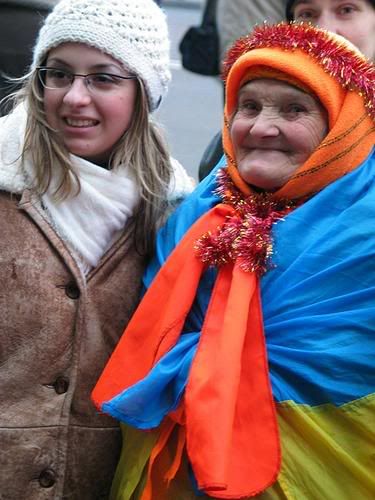
And - so much for the "I've come here as if to my own family, to my mama, my daughter" kind of blah-blah-blah from Tymoshenko...
So here's more stuff:
- from the Guardian - Ukraine's wedding of the year;
- from the Times - Bells, bagpipes and a bit of a do . . . Ukrainian style;
- from the Independent - Ukrainian love story pairs a billionaire's daughter with a Leeds rocker;
- from the BBC News - Ex-Ukraine PM's daughter marries;
- from CNN.com - Tymoshenko's daughter weds rocker;
- some AP photos at Maidan.org.ua;
- a story and some photos in Ukrainska Pravda (in Ukrainian)...
Too bad Ukrainska Pravda very promptly took down the photo of Oleksandr Volkov and his female companion marching to the evening celebration: some people are concerned about Sean Carr's temperament and his criminal record, but you know it's no longer relevant when you see tough guys like Volkov and Mykhaylo Brodsky as wedding guests. No one would want to mess with them, not even a crazy-looking fellow like Carr. (Another photo that Ukrainska Pravda got rid of was of Mykola Tomenko, and it probably happened because his female companion looked like a cow.)
***
What I really like about it all is the eccentricity of Evgenia Tymoshenko: the air of eccentricity around her that does not diminish even in the presence of men like Volkov and Brodsky.
What I hated about the wedding is this little episode involving Paraska Korolyuk, an elderly woman who became one of the symbols of Maidan last year. According to Komsomolskaya Pravda (in Russian), baba Paraska arrived in Kyiv on a train Friday morning to attend Evgenia's wedding, bringing a beautiful wedding gift with her, a Ukrainian traditional towel, rushnyk, that her daughters had spent three days embroidering:
"I want to lay it underneath my grandkids' feet in the church. Why are you surprised? Yulia is like a daughter to me, and that means that Zhenya [Evgenia] is my granddaughter. Yulia has personally invited me to the wedding."
Someone from Tymoshenko's Batkivshchyna party picked baba Paraska up at the train station and drove her to the party headquarters, where she spent about an hour and then emerged, no longer looking boisterous and happy, and without her rushnyk. She'd been told that the wedding was in three days and that no one was invited to the church ceremony, and since she had nowhere to stay in Kyiv, she intended to take the train back home that same day.
Silly old fool, a heartbreaking silly old fool.

And - so much for the "I've come here as if to my own family, to my mama, my daughter" kind of blah-blah-blah from Tymoshenko...
Subscribe to:
Posts (Atom)
